#燧石
Text
燃烧激情,防患未然!教你如何预防维修BBQ燒烤爐故障?
燃烧激情,防患未然!教你如何预防维修BBQ燒烤爐故障?
大家好,我是你的烧烤达人小助手。今天我要和大家分享一些有关预防BBQ燒烤爐故障的经验和技巧。毕竟,我们在炙热的炭火中追求美味的同时,也要保证人身和设备的安全呢。
首先,让我们从设备的维护开始。购买一个优质的BBQ燒烤爐是十分重要的。品牌和质量是选择的关键,好的燒烤爐具有更高的耐用性和安全性。建议您在购买前仔细阅读产品说明书,并确保产品经过认证,符合安全标准。
其次,定期对燒烤爐进行清洁和维护是不可忽视的。使用后,将炭渣和食物残渣清理干净,保持燃烧腔内的通风畅通。还要注意清洁燧石和燃烧器的堵塞情况,如果发现有阻塞或损坏,及时更换或修理。另外,在存放燒烤爐时,要尽量避免潮湿和高温的环境,这有助于延长设备的使用寿命。
第三,懂得正确使用燒烤爐也是必要的。在点火前,确保燃烧腔内无燃气泄漏。如果嗅到燃气味道,请立即停止点火,并检查设备…
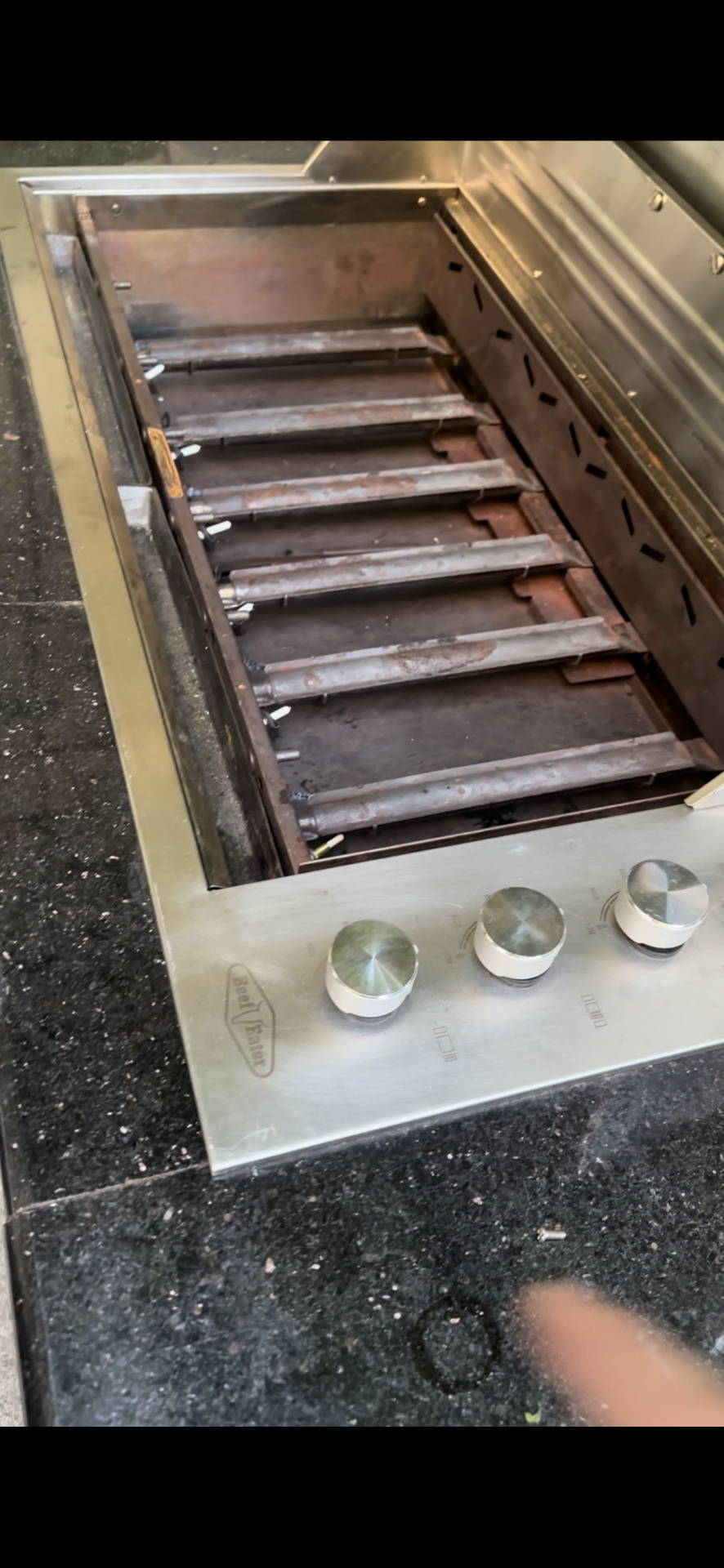
View On WordPress
0 notes
Text
美国人现在重返月球怎么感觉比当时第一次登月还费劲
看技术史的感觉是技术路线的开拓存在无数的If线和可能性,比蝴蝶舞动翅膀还轻微的一点因子,比如本地有没有某种材料、动物、植物、矿物、自然现象,看起来和技术毫不相关的社科点数(比如宗教、思想、民族性,某个人的个人想法,偶然的巧合)。
然后再把各个文明内部的这些东西通过交流和战争融合在一起,几万个变量随机结合、产生各类化学反应,终于在无数个超展开之后诞生了的如今的科技路线。如果把里面的任何一点进行随机摆动,整个技术史说不定都能易轨
你以为是这样的:单向的线性发展,只要加大投入,不断向前,一定可以追上某个点
说不定是这样的:球形、万向,有无数可能性和随机性的发展,现在是沿着里面的几根线在前进。里面的一些点,是沿着现有方向如何前进也极难抵达的。这个图是生命树,生物从一个原点分开演化成各种界门纲目科属种的的演化图,和技术演进的随机性IF线很像吧
落后现代几个次元的准野人用石头片子拼巴出来的东西(金字塔、巨石阵、复活节岛石像、燧石异形雕),一旦中间失去传承,想用同样条件进行逆向工程来复现原始工艺都有点头皮发麻了。再想想工业时代的
0 notes
Text
每日聖言誦讀:聖周星期三
讀經一(誰要同我爭辯,讓他們一起來吧!)恭讀依撒意亞先知書 50:4-9A上主賜給了我一個受教的口舌,使我知道如何用言語援助疲倦的人。祂每日清晨喚醒我的耳朵,使我聽見祂的聲音。我沒有違抗,也沒有退避。我將我的背轉給打擊我的人,我把我的腮轉給扯我鬍鬚的人。對於侮辱和唾汙,我並沒有遮掩我的面。吾主,上主是我的援助,因此我不以為此恥;我板著臉,像一塊燧石,因為我知道我不會蒙受羞辱。那給我伸冤者已來近了。誰要和我爭辯,讓我們一起站起來吧!誰是我的對頭,讓他到我這裡來吧!看,上主是我的援助,誰還能定我的罪呢?——天主的聖言。
答答唱詠 詠69(68):8-10,21-22,31,33-34【答】上主,按禰偉大的仁愛,(參看:詠69(68):14C)領:上主,我為了禰飽受欺淩,羞愧籠罩了我的面容。我的弟兄以為我是外賓,我母親的兒子拿我當客人,因我對禰聖殿的熱愛把我耗盡,那侮辱禰者的辱駡落於我身。…

View On WordPress
0 notes
Link
0 notes
Text
「藝術是人類精神昇華的一種語言,藝術是表達人類精神活動的一種創造。」
人類歷史學家Yuval Noah Harari在著作裡談到,人類會滅絕或是永續,關鍵在於「語言與故事」。
起源歷史中,人類掌握工具的使用已經兩百萬年,但智人種一直是個邊緣化、弱小的物種,而且在同一時期,競爭關係的尼安得塔人有著更高的智商、更強壯的骨骼與肌肉,考古證據顯示,智人對尼安德塔人的衝突從來沒有優勢。
不過,智人率先發展出了「認知革命」,不止如其他動物擁有自身溝通語言而已,智人的認知革命中包括了:集體想像與創意,懂得討論現實與虛構事物、創造共同信念等等。
新的證據顯示在七萬年前,智人開始逆轉局勢,智人的擴張範圍前所未有,而尼安德塔人漸漸在競爭當中消逝蹤跡。在三萬年前,藝術品等等的證據更顯示智人已出現了宗教神話、商業、社會分層。
在生物學上發現,靈長類物種的群體極限,達到數字一百五十人時是一道檻,超過之後便開始一盤散沙、自亂且衝突。「新的語言認知與故事能力」使智人種脫離了這門檻,出現更大的共同合作機制,宗教、城邦、國家顯現,甚至構想出商業模式與有限公司的法人概念,不僅如此,在群體中,智人開始思考關於人權的意義。
現今,我們不再是三萬年前拿著獨自製作燧石長矛的人類,「新的語言認知與故事能力」,先是產生現實與虛構概念的想像力,能讓自身思考延續到不認識的眾人的集體想像,再來是真理的挖掘,在複雜的分工與接力中誕生出科學研究,產出對量子力學、相對論的物理科學認知,智慧型手機便是量子力學的運用產品、以及相對論運用在地圖導航上等等,即便不懂這些科學,我們也能在世界貿易的體系當中使用到這些產品。
其實,到如今,我們的身體機制演化與三萬年前相比並無不同,但是我們不斷的誕生許多新語言模式、行為模式,進入「文化」的演化,而人類的「認知革命」是正式從生物學脫離而獨立出歷史學與文化的一個起點。
探討新的語言與文化,於是我在前幾天參加了一個別具意義的座談:「比國片更需要搶救的電影評論: 另一種電影研究和電影史研究如何可能?」
事後有人問我:「原來你想要讀研究所是你想要研究國片呀?」其實,我正是在研究新的語言與敘事的可能性,如同舞蹈藝術是一種新的語言系統,透過肢體的傳達,無論是意象的、文學性的象徵、或是暗喻的。
「一部藝術的歷史,往往就是一種藝術語言的發明、形成與發展的歷史,一種確立規則與超越原本規則,創建法度與重構法度的歷史。
一種藝術的研究,首先應是一種藝術語言的研究,一種語言表達方式與意義的研究。」 《電影語言學導論》
座談當天,我詢問了一個問題,完整的內容:
「台灣有沒有辦法透過自身電影史的書寫,建立起自身的文化脈落與認同感呢?抑或是遙遙無期。
如同二戰之後的歐洲,透過電影急於重建自身文化、爬梳歷史一樣,並且義大利威尼斯建立起世界第一個城市影展,而德國柏林把自身的滿目瘡痍與斷垣殘壁赤裸裸的擺在公眾面前,並透過影展爬梳歷史、探討政治性、與社會性的話題來持續與觀眾對話。
在台灣,例如台北的大稻埕碼頭曾是亞洲最繁榮的港口,也是台灣這塊土地一百年前的首都等等。透過這類歷史中的符號與意義,台灣能否以電影史的書寫從新梳理與建立品牌認同,並透過電影史的書寫,幫助大眾的思考與文化上的建立,是可行的嗎?」
這是個提問,也是試圖與講師共鳴以影像為語言尋找研究的多種可能性,提問內容就包含了品牌的塑造、國家政策的發展、歷史的探討、社會的意識建構等等。
講師的資深研究背景與文化部長幕僚的經歷給了我一些在心裡共鳴的答案,雖然短時間裡無法述說太多,其中也談到了關於電影創作與敘事的改變,這需要把片斷的內容由整體的脈落研究之下,才能把國片帶出新的高度,如同我問題裡所提到的大稻埕故事就是如此。
說到國片也讓我想到《斯卡羅》這部劇集,原創者陳耀昌醫師為《傀儡花》所做的細緻台灣史研究,因著人類對新語言認知與說故事的欲望,陳醫師亦是接續過去研究者的片斷研究,油然生出使命感的他,投注大量的時間來剖析建構出完整的故事脈落,雖然在後來的斯卡羅劇集播出後,他感到可惜,他說這部劇應該帶著特別的使命感來以正確史觀敘事才對。
但是換個角度來說,正因為陳耀昌醫師的研究才讓故事有了更多的可能性與思考方向。我相信未來在台灣無論是電影或是各個領域都會有更多不同的敘事與創造性成果出現,唯有不斷深入耕耘,不論是以電影為語言所研究的美學、社會學,甚至科學、歷史,亦或是文學、舞蹈等各個領域。
在這些繁盛的思緒語彙當中,潛心在浩瀚文史長河的研究者就如張嘉佳的短篇小說《擺渡人》所談的狀態。好比當天講師最後跟我說的:我願意樂觀的看待這些努力的研究過程,眾人一起,即便需要兩三代的人共同努力,也有擺渡上岸的那天。
0 notes
Photo
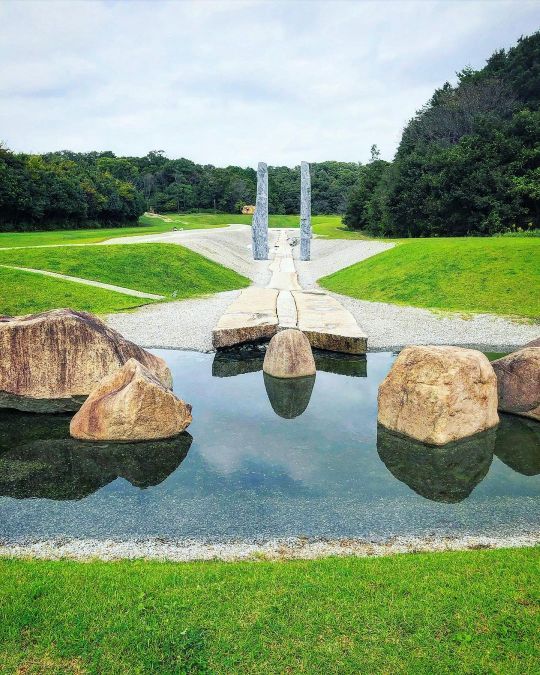
📸天空の庭ミュージアム / Shinonkyo Tenkuu-no-niwa Museum, Tsu, Mie 三重県津市の『天空の庭ミュージアム』が素敵…! 世界的芸術家 #イサム・ノグチ の共同制作者で、京都迎賓館などに作品を残す石彫家 #和泉正敏 が作庭した野外彫刻庭園。2021年に永眠された氏の遺作も残ります。京都の数寄屋建築の巨匠 #中村昌生 が手掛けた茶室も。(通常非公開/特別公開期間あり) . 三重・天空の庭ミュージアムの紹介は☟ https://oniwa.garden/tenkuunoniwa-museum-mie/ ...... ここ数週間、世の中に「新宗教」が話題になっていて、その中でちょっと紹介しづらい所もあるのだけど…昨年2021年に足を運んだ庭園で最後に紹介するのがこちら。 . 権力者・寺院・神社・新宗教。色んな背景のある庭園がありますが、あくまで「庭園」としてご覧いただけると嬉しい。 . 「天空の庭ミュージアム」は世界的彫刻家:イサム・ノグチの日本国内の制作パートナーであり、自らも『京都迎賓館』『東京ミッドタウン』等に作品を残した石彫家で2021年までイサム・ノグチ日本財団理事長もつとめた和泉正敏さんによる彫刻庭園。 . この庭園を知ったきっかけは、元は京都の茶室/数寄屋建築の巨匠・中村昌生さんの実績にあった茶室“光風亭”について調べ始めた所から。 . 昭和年代の半ばに設立された新宗教団体『ミロクコミュニティ救世神教』が三重県津市に造苑した聖地・神恩郷の中にその茶室があるっぽい…と調べを進めていたら、その苑内には和泉正敏さんにより2012年に作庭された庭園“天空の庭”がある/そして『石楽展』という期間限定の一般公開があると分かり…。 で、2021年10月の『石楽展』で初めて訪れました。 . 和泉正敏さんが手掛けた庭園としては2021年1月には『観音寺市斎場“燧望苑”』にも足を運んだ。 燧望苑が個人的にはものすごくかっこよくて好きな庭園だったので…この石楽展もとても楽しみにしていたのだけど、足を運ぶ直前の9月に和泉正敏さんが永眠。 . この“天空の庭”の中には2021年夏に制作/作庭されたばかりの彫刻作品群「こもれび道の石群」「光風台の石群」もあり、これらは氏の遺作ということになります。 . なお撮影可能な彫刻作品は写真の“天空の庭”“夢湖”と、通年で一般の方も入場可能な「おまつり広場の石群」の“子供たちのための宇宙石”のみ。実際は50以上の石造物・彫刻作品が並ぶ広大な芝庭。 . 和泉さんが石のアトリエをかまえていた四国・高松の牟礼の銘石“庵治石”をはじめ、巨石や奇石なども用いた庭園。 “天空の庭”の最奥にポツンと置かれている巨石は瀬戸内海の太郎島🏝の頂上にあった自然石を「どこかに置かれるべきだ」と構想していたものを、この庭園に運び込んだもので、園内では“天之磐座”と名付けられています。 続く。 ーーーーーーーー #japanesegarden #japanesegardens #beautifuljapan #japanesearchitecture #japanarchitecture #japanarchitect #japandesign #japanart #japanmuseum #japanartmuseum #artmuseum #jardinjaponais #jardinjapones #建築デザイン #アート #現代アート #庭園 #日本庭園 #庭院 #庭园 #美術館 #庭園美術館 #isamunoguchi #彫刻庭園 #野外彫刻 #openairmuseum #おにわさん (天空の庭ミュージアム) https://www.instagram.com/p/CgjA_rtP_3Y/?igshid=NGJjMDIxMWI=
#イサム・ノグチ#和泉正敏#中村昌生#japanesegarden#japanesegardens#beautifuljapan#japanesearchitecture#japanarchitecture#japanarchitect#japandesign#japanart#japanmuseum#japanartmuseum#artmuseum#jardinjaponais#jardinjapones#建築デザイン#アート#現代アート#庭園#日本庭園#庭院#庭园#美術館#庭園美術館#isamunoguchi#彫刻庭園#野外彫刻#openairmuseum#おにわさん
1 note
·
View note
Link
0 notes
Text
柏木山で猛暑の朝活

連日暑すぎて、とろけそう…。でも、体力維持のために山には登っておきたい…。散々悩んだ挙げ句、早朝からサクッと行って帰って来られそうな未踏の低山、柏木山(かしわぎやま)から燧山(ひうちやま)、龍崖山(りゅうがいさん)を歩いてきました。
とは言え、結局あまり早起き出来ず、6:18に飯能駅をスタート。
YAMAPで決めておいたルートを敢えて無視して、気の向くままに川沿いを歩いたり近道したりしながら適当に登山口に向かいました。
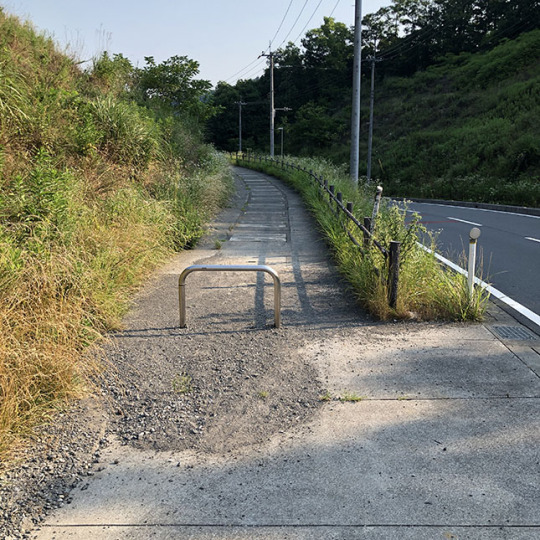
40分ほどで柏木山の登山口に到着。
登山口というか、茜台自然公園の入口なんですが。
そしてこの写真の右手奥から歩いて来たのですが、一番奥に見える電柱の辺りの歩道側に、何とカモシカと鹿のまだ新しそうな亡骸が…。
5m以上は離れていたので、この二頭の死に関連があるのかは分かりません。
お互いがぶつかった衝撃で倒れたのか、それぞれ車に撥ねられたのか、はなまた猛暑に耐えかねて亡くなったのか…。とにかく痛々しかったです。

さて、気持ちを切り替えて山に入ります。
自然公園はワイルドに草が生え放題。

道は真っ直ぐ続いていますが、私は右手の階段を上がって行きます。

少し登ると、天覧山、多峯主山、物見山が見えるビュースポットに出ました。

そこから左手に更に進んで行くと、正面に天覚山が見えました。
あんな形だったのね。
そうそう、今目指している柏木山は、2月に登った飯能アルプス(西側)で多峯主山から久須美ケルンに向かう途中で出会ったオジサマ①から教えてもらって以来、ずっと気になっていたお山なのです。
本来は、冬場に登るつもりで残してあったのですが、サクッと登るにはちょうど良い距離だったので、冬まで待てずに来てしまいました。
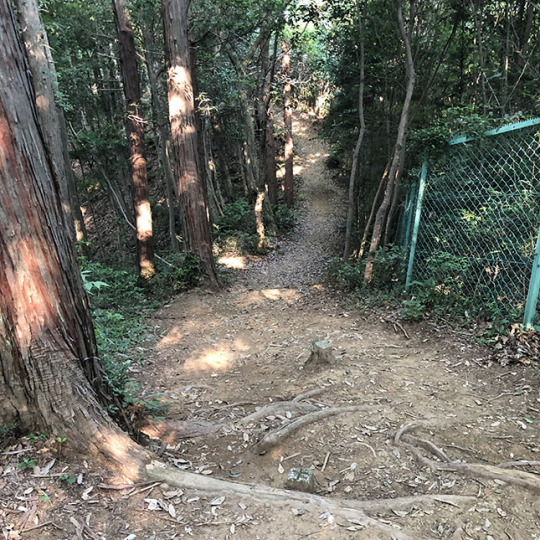
右手に緑のフェンスを見つつアップダウンが続きます。

標識もしっかりとあるので安心。私はこのままフェンスコースを進みます。
途中、「富士見の丘」もありましたが、今日は曇っていて見えませんでした。
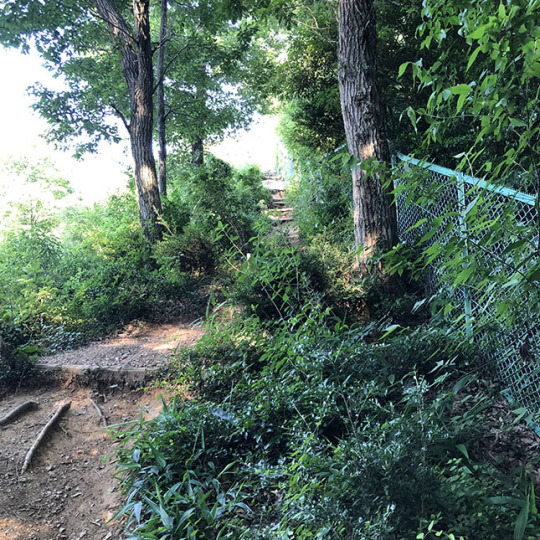
おや、あの明るい光は…
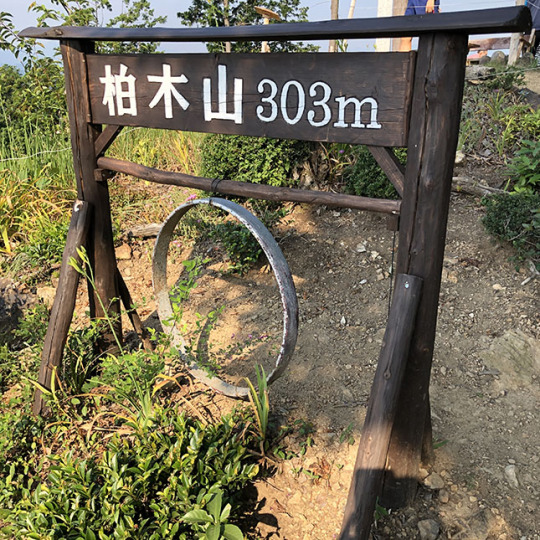
柏木山の山頂に到着!標高303m。
低いけど、朝から沢山のハイカーで賑わっていました。
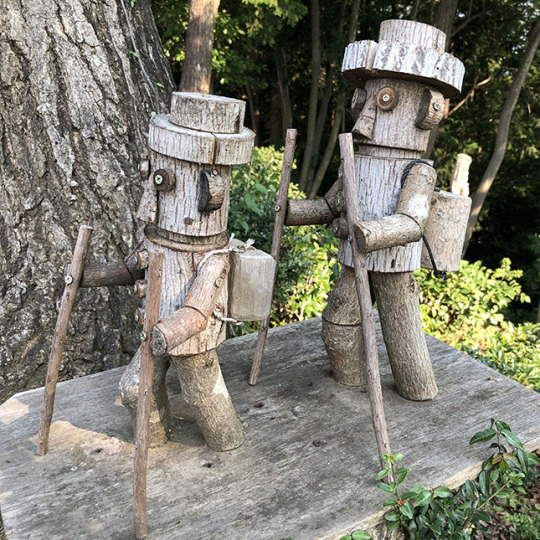
あら、こんな所に「あたごくん」!
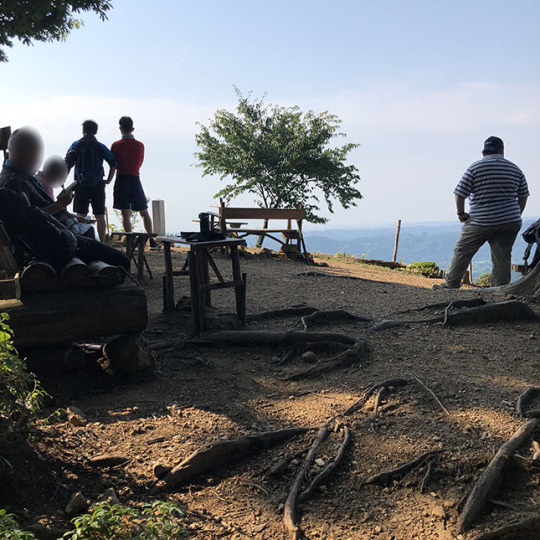
皆さん、思い思いに山頂での時間を楽しんでいます。

では、失礼して私もここで朝ご飯。7:40だから普段の朝食より早めです。
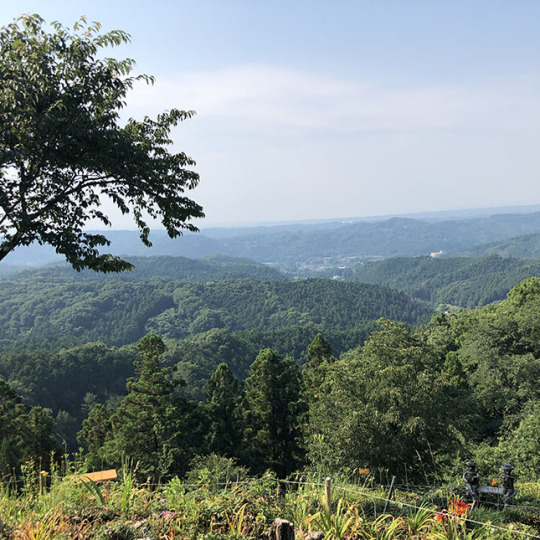
眺望も良好。トリミングしちゃいましたが、左手には都心方面も。
あれ?画面右下に何かある???

楽器を持った「あたごくん」でした。

復路は「かもしか新道」を下って行きます。
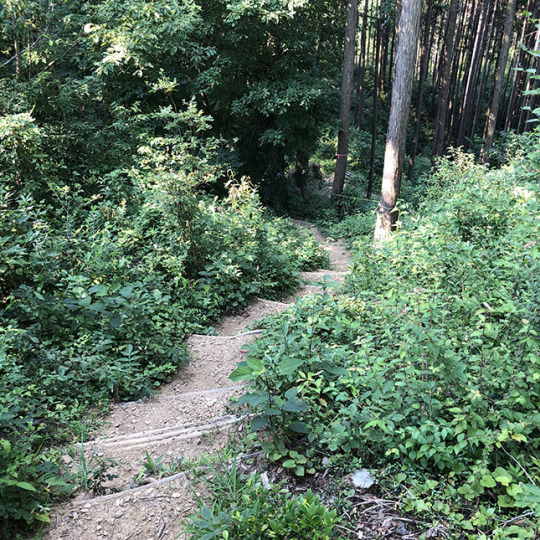
長い木段が続いています。
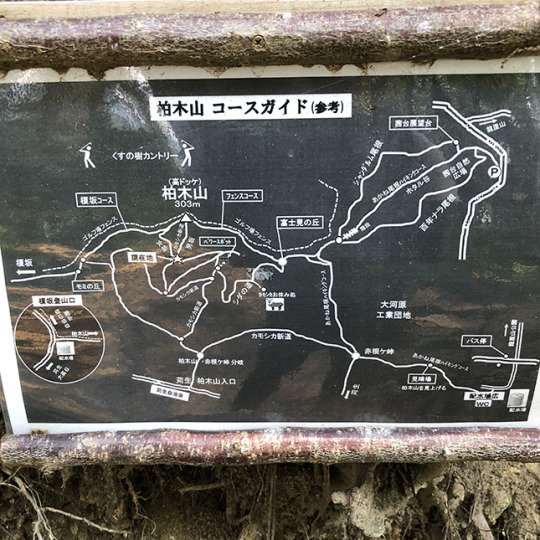
途中にコースガイドがありました。
YAMAPの地図には載っていないルートもあるようなので、参考にしました。

更に続く緩いくだりの木段。ここは小走りで駆け下りました。

少し広い道にぶつかるT字路の角に、紫陽花が咲き残っていました。
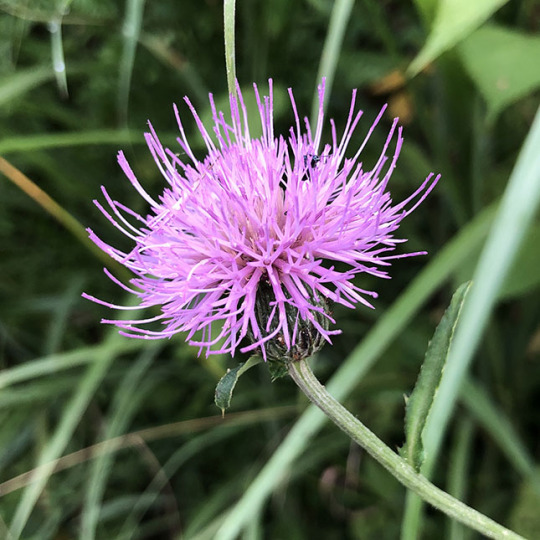
オニアザミ(鬼薊)も咲いています。
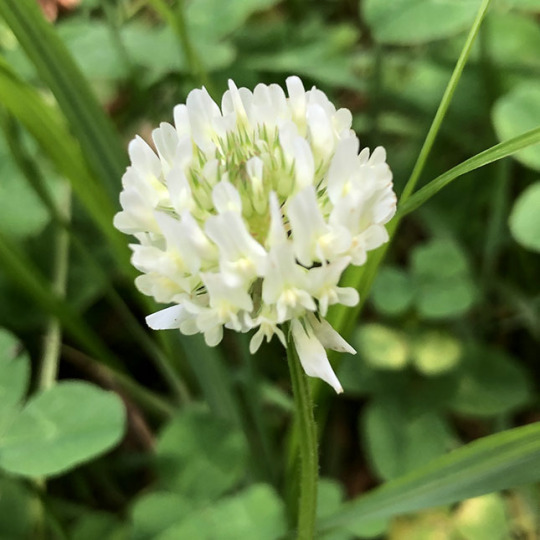
足元にはシロツメクサ(白詰草)がいっぱい。

ドクダミも群生していました。
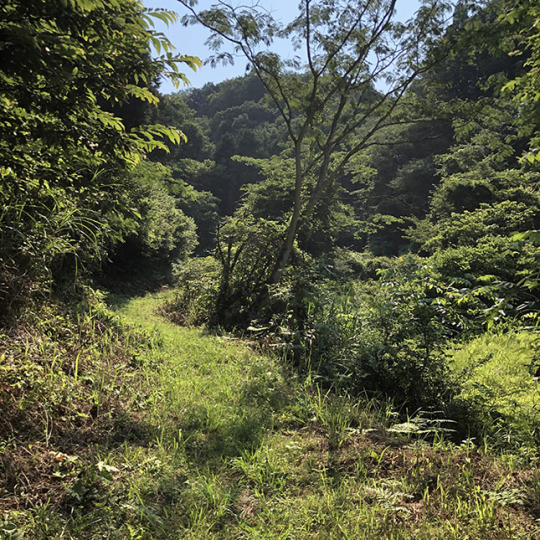
ここからは草の生えた陽当たりの良い道。
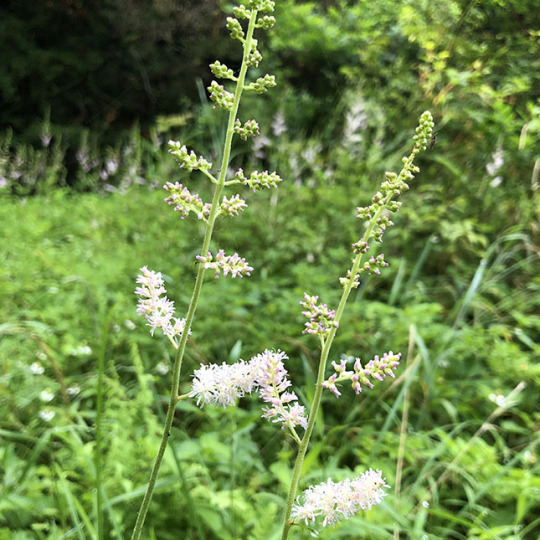
チダケサシ(乳茸刺)という花だそうです。
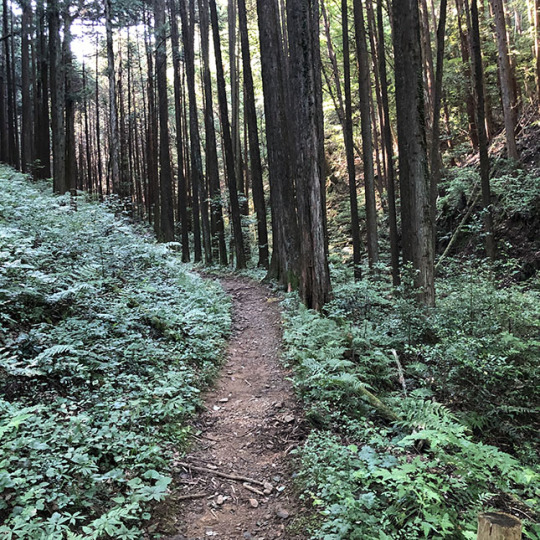
今日みたいな日は、やっぱり木陰の道が歩きやすい。

赤根が峠に到着。さっきの公園は「茜」でこちらは「赤根」なんですね。
もともとの地名は赤根なのかな?

みはらし台までやってきました。
工場や企業の屋根が見える、ベンチが2基ある広場です。
ここからは、資材置き場のような所に沿って平坦な遊歩道を歩きます。

遊歩道沿いには花が沢山咲いていました。
こちらは、コマツナギ(駒繫)だそうです。
一瞬、ハギ(萩)?とも思いましたが、ハギは秋の花ですもんね。

地元の公園にも咲いていますが、ネムノキ(合歓木)。葉も花も特徴的。
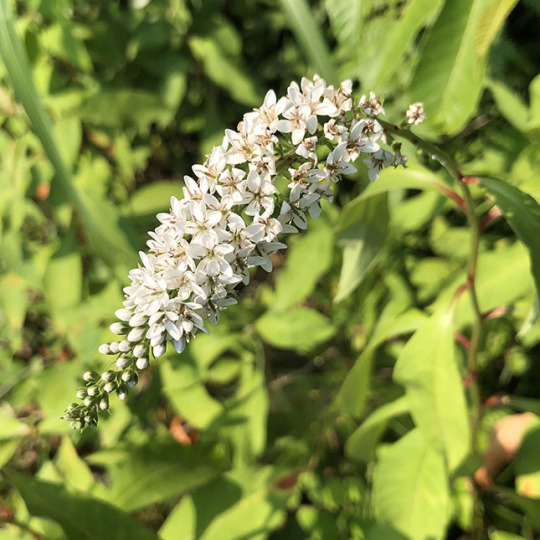
オカトラノオ(丘虎の尾)も沢山咲いていました。

遊歩道が終わった所に小さなトイレがあり、配水場から真っ直ぐ進んで行くと龍崖山公園に到着。ここにも綺麗そうなトイレがありました。
写ってませんが、画面右奥の住宅街の前には自販機もありました。
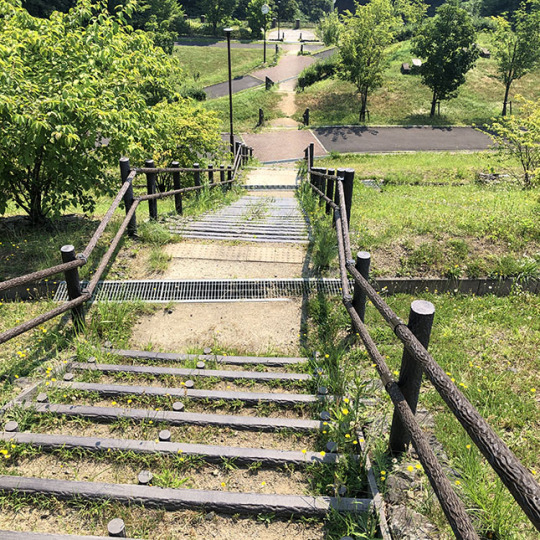
公園に入り、長い階段を下って行きます。8:40、既に日差しが眩しい!

登山口では、龍の門がお出迎え。左右でデザインが違いますね。

少し登ると、熊よけの鐘が。え、こんな住宅街の小山に熊、出るの???
でも、さっきカモシカと鹿も居たしな〜。熊が居ても不思議じゃないか…。
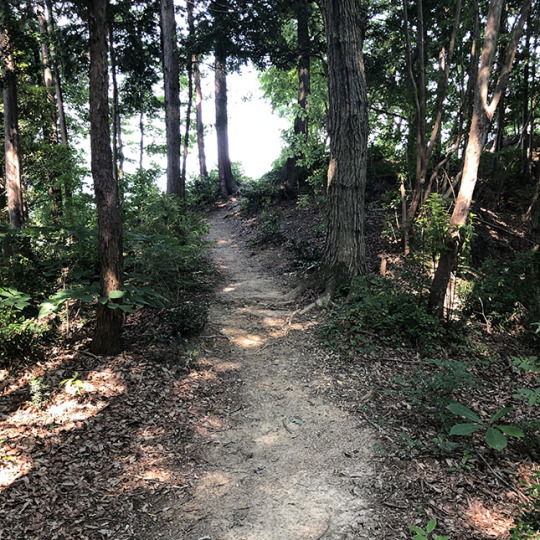
アップダウンを繰り返して、あの明るい光は…
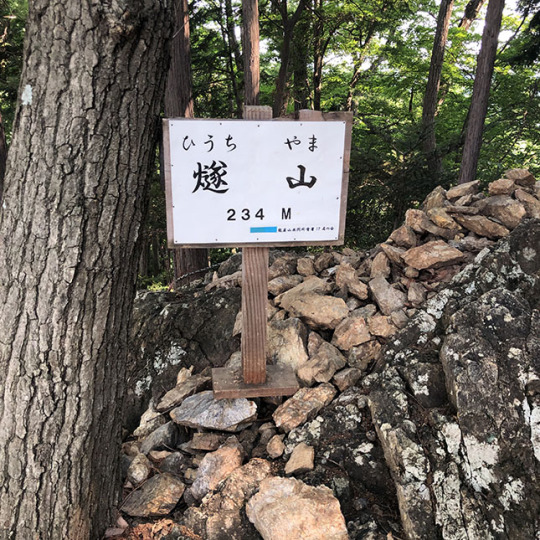
ハイ、本日の二座目、燧山に到着!標高234m。低い!

ここからは、さっきまでいた柏木山の山頂が見えました。

ベンチでナルゲンボトルに水を補給します。
昨夜凍らせておいたプラティパス、まだ半分以上凍ってる〜♬
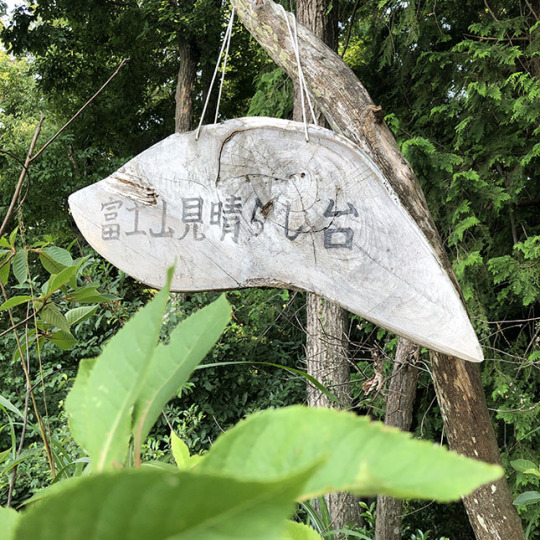
「富士山見晴らし台」に着きました。

うん、今日は見えないよね。知ってる。
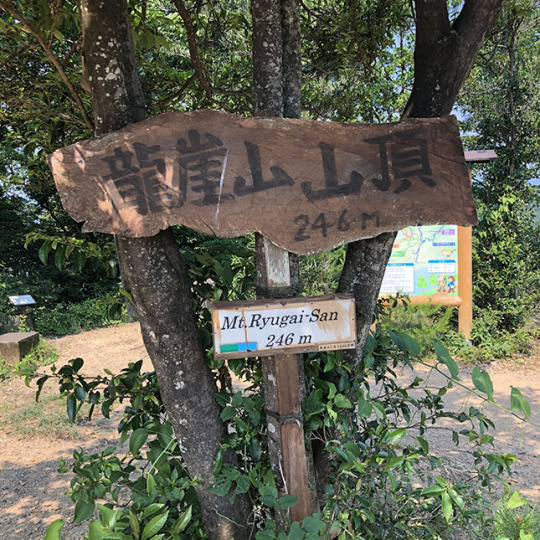
更に登って、龍崖山の山頂に到着!標高246m。
ベンチは沢山あるけど、日陰がない…。

景色は良好。姉さん被りで旅人姿の木彫りの人形にドキッとしました。

29℃か〜。これからどんどん気温が上がるんだろうなぁ。
ということで、サッサと下山することに。
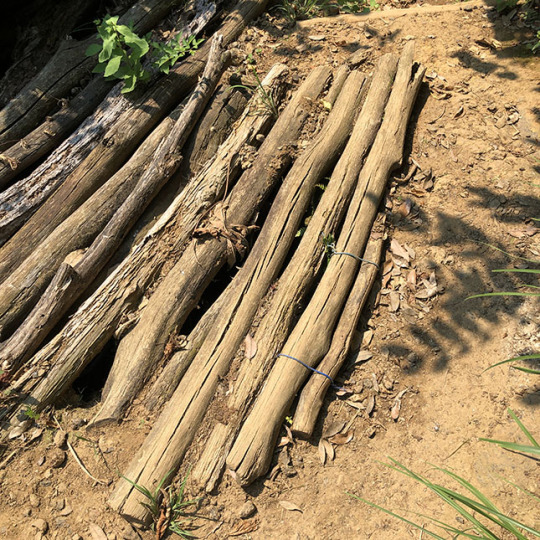
陥没箇所を木の棒で塞いでくれていますが、一見落とし穴にも見える…。
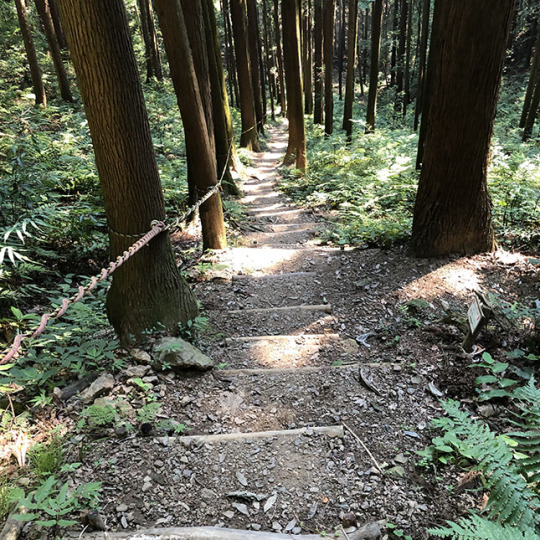
そしてこの階段が長かった。石割山の最後の階段を彷彿とさせる…。
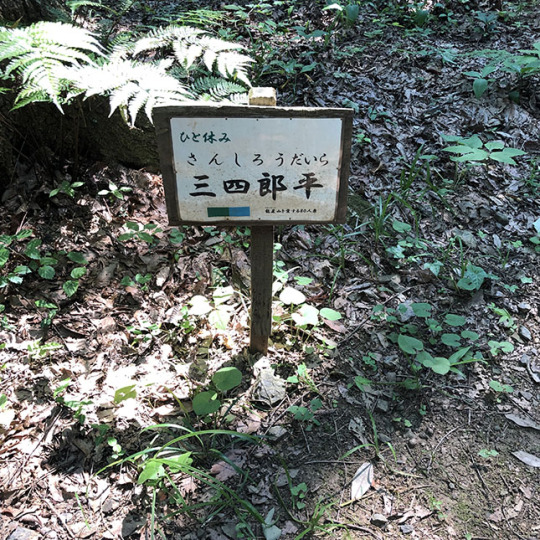
三四郎平に到着。
実はこの山の標識は「龍崖山を愛する80人衆」の皆さんのお手製なのですが、ここを通過しようとした時、前方から「龍崖山」というネーム入りのキャップを被った90歳前後のご老人がやって来ました。
「あれはきっと、80人衆のお一人に違いない!」と一人密かに興奮してしまいました。
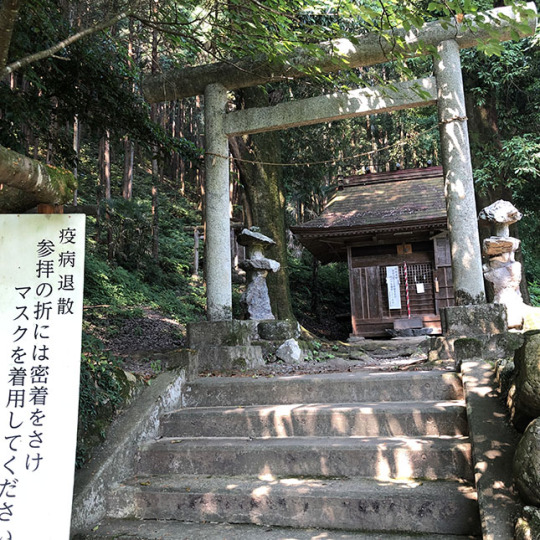
最後は、奥の院もある神社の鳥居を幾つか潜り抜け、
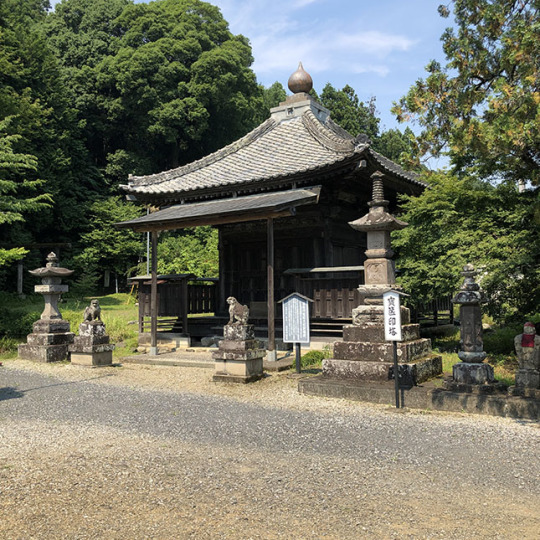
八耳堂(はちぢどう)でゴール。綺麗な水洗トイレもありました。
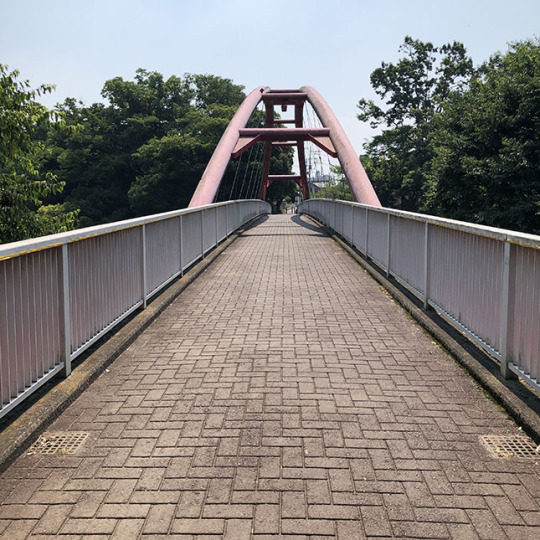
帰りもYAMAPのルートを無視して、駅に向かって歩きたい道を進みます。

橋の上からは飯能川原で水遊びを楽しむ人々が。気持ちよさそう♬
昔はここでBBQとかしたな〜、私も脚を冷やしたいな〜などと思いつつ、気温が上がる前に帰路につきました
0 notes
Text

(I used the black and white because without any official color work, I don't actually trust the digital colorist's guesses to reflect much of Kubo's intent. Save for Mera's red hair... given the use of toner and her fire powers, I can't imagine her hair would've been anything but bright red, like Renji's.)
Hiuchigashima[燧ヶ島] MERA[メラ]:
"signal fire/hand-drill* island," "ME-RA"
*like a hand-drill for starting fires. Also a homonym with hiuchi[火打ち石]: "flint" and I've seen this part of her name somewhat erroneously translated as "tinder." Basically the common thread in all these readings being fire starters.
**taken from the onomatopoeic or mimetic sound/phrase meramera[メラメラ]: the sound of flaring up, or the sound of bursting into flames.
Tonokawa[砥ノ川] Tokie[時江]:
"Whetstone/Grindstone's River," "Time Bay"
Hashihara[箸原] HASUka[ハス花]:
"Chopsticks Field," "HA-SU* Flower"
*with HASU[ハス] here being a homonym with hasu[蓮]: Lotus/Sacred Lotus/Indian Lotus.
Nomino[鑿野] Nonomi[のの美]:
"Chisel Field," "NO-NO Beauty"
*technically it's the same either way but no[の] as hiragana is the grammatical possessive, where as in a name you'd normally expect it to be the kanji no[乃] but they mean the same thing. And incidentally the name Nonomi would normally be written [乃々実].
Tsuchimiya[槌宮] Tsumiko[罪子]:
"Hammer/Mallet Princess," "Guilty/Criminal Child."

I dunno why I thought to tackle these 5 as they really don't do much, but it feels like a neatly compact example of Kubo's naming sensibilities, because unlike characters that got to actually speak and interact with others and have any kind of a story of their own, their names are almost all we know about them; that and a few simple tonal notes in how they talk or carry themselves in the one scene most of them show up in.
Obviously the girls are each named after a tool used in sword smithing and serve that role in assisting Oh-etsu. And since they're each a zanpakutou, like the rest of Nimaiyas harem, it feels like it's implied that they are each literally said tool, instead of the more conventional katana. It's kind of weird considering how zanpakutou have worked up until this point in the story, but like much of the final arc we just kind of move on and never elaborate or explore this idea... (It almost feels like an entire Soul Eater thing is implied here, but we'll just never know...)
Its also weird that the girls get full names, with distinctly humanlike etymology and what appear to be full on surnames considering they're all zanpakutou and so you'd expect them to have a singular name, almost more like a title, and more in line with the zanpakutou names we already know.
You can probably tell Kubo decided to lean into this weird alliterative thing with the names. Ironically Mera is named after the meramera thing I mentioned, but her actual full name is the only one without the repetitive phonetics. Otherwise the girls all evoke the repeated sounds, Meramera, TokiToki, HasuHasu, NomiNomi/NonoNono, and TsumiTsumi. I feel like there are some sort of homonyms, or sounds like meramera, or other wordplay at work here that I just don't know enough outside of textbook Japanese to pick up on...

A random note: I find it funny that Mera's design feels like it was a last minute twist on Kubo's usual wildtype that he just knew he'd never get the chance to throw in there otherwise... Bazz-B's mohawk and fire powers, Renji's hair color, Grimmjow's eyeliner... kind of some Hiyori/Shino adjacent spunky girl energy? She feels like she'd fit that whole character type, even though we barely got to hear from her. It would've been nice to see a spicy tomboy actually involved in the story.
And maybe it's just a coincidence but it almost feels like there's a wuxing thing going on with the girls with the classical 5 daoist elements reflected in their names and tools: Fire-starters, Water-quenching and river/bay, wood "Chopsticks"/Tongs and flower, metal Chisel, and earth Hammer.

17 notes
·
View notes
Text
Lu Ji’s “Discourse on the Fall of Wu (Part 2)”
The second part of this post.
其下篇曰:昔三方之王也,魏人據中夏,漢氏有岷、益,吳制荊、揚而掩有交、廣。曹氏雖功濟諸華,虐亦深矣,其人怨。劉翁因險以飾智,功已薄矣,其俗陋。夫吳,桓王基之以武,太祖成之以德,聰明睿達,懿度弘遠矣。其求賢如弗及,血阝人如稚子,接士盡盛德之容,親仁罄丹府之愛。拔呂蒙於戎行,試潘浚於系虜。推誠信士,不恤人之我欺;量能授器,不患權之我偪。執鞭鞠躬,以重陸公之威;悉委武衛,以濟周瑜之師。卑宮菲食,豐功臣之賞;披懷虛己,納謨士之算。故魯肅一面而自托,士燮蒙險而效命。高張公之德,而省游田之娛;賢諸葛之言,而割情欲之歡;感陸公之規,而除刑法之煩;奇劉基之議,而作三爵之誓;屏氣跼蹐,以伺子明之疾;分滋損甘,以育淩統之孤;登壇慷愾,歸魯子之功;削投怨言,信子瑜之節。是以忠臣競盡其謨,志士咸得肆力,洪規遠略,固不厭夫區區者也。故百官苟合,庶務未遑。
And in the second part he wrote:
"Formerly, the realm was split into three kingdoms. The people of Wei occupied the Central Plains, the clan of Han possessed the regions of Min and Yizhou, while Wu controlled the provinces of Jingzhou and Yangzhou and spread to grasp the lands of Jiaozhou and Guangzhou. But although the Cao family had performed outstanding achievements among the Xia (ethnic Han) people, their cruelty was just as great, stirring up the people's hatred against them. As for the old codger Liu (Liu Bei), though he controlled difficult terrain and had pretensions to cleverness, his achievements were slight things, and his state was a mean and vulgar one. It was very different with Wu, which had its foundation laid down by the martial feats of King Huan (Sun Ce) and completed by the virtues of Taizu (Sun Quan).
"How numerous were Taizu's good qualities! He was intelligent and wise, astute and perceptive; he was understanding and measured, generous and farsighted. He sought out worthy people as though worried that he would never have enough of them, and he sympathized with the people as though they were his own children; he drew people in with complete demonstrations of his abundant virtues, and he exhibited kinship and benevolence through utter displays of love and affection. From out of the rank and file of the soldiers did he pluck Lü Meng; from among the masses of the captives did he recruit Pan Jun. He was ever sincere and invariably trusting, with no reservations that we might be swindled or cheated; he was always taking the full measure of a person and employing them according to their full potential, with no suspicion that his proteges might turn against us.
"He could confer the whip of authority upon others, as displayed by the power he granted to Lord Lu (Lu Xun); he could entrust the military defense of the state to subordinates, as exhibited by the army he assigned to Zhou Yu. He lived in a humble palace and ate meager fare, so that he might richly reward the achievements of his subjects; he was modest and unassuming about himself, the better to accept the plans and strategies of his advisors. Thus did Lu Su join him after only a single meeting; thus did Shi Yue yield to his rule despite the natural defenses of his own domain.
"He respected Lord Zhang's (Zhang Zhao's) virtues and so dispensed with the frivolities of wandering and hunting; he honored Zhuge Jin's advice and so reduced indulging his personal wishes and desires; he was moved by Lord Lu's (Lu Xun's) arguments and so mitigated the burdens of the laws and punishments; he was impressed by Liu Ji's criticism and so swore 'the oath of the three cups' (to ignore his commands while drunk). Holding his breath and treading silently, he peered through the gap in the wall to observe Ziming (Lü Meng) on his sickbed; fighting back tears and denying himself delicacies, he adopted the orphans of Ling Tong; ascending the altar and overwhelmed by emotion, he recalled the achievements of Lu Zijing (Lu Su); dismissing and denying words of slander, he trusted in the good faith of Ziyu (Zhuge Jin).
"His loyal ministers all exhausted their minds for his sake, and his ambitious subjects all devoted their full strength to his cause. His aims and ambitions were distant and lofty indeed, nor was he content to restrict himself to a small domain. And for that reason, his offices of state formed quite the collection, nor had he ever any respite from his affairs.
初都建鄴,群臣請備禮秩,天子辭而弗許,曰:「天下其謂朕何!」宮室輿服,蓋慊如也。爰及中葉,天人之分既定,故百度之缺粗修,雖醲化懿綱,未齒乎上代,抑其體國經邦之具,亦足以為政矣。地方幾萬里,帶甲將百萬,其野沃,其兵練,其器利,其財豐;東負滄海,西阻險塞,長江制其區宇,峻山帶其封域,國家之利未見有弘於茲者也。借使守之以道,禦之以術,敦率遺典,勤人謹政,修定策,守常險,則可以長世永年,未有危亡之患也。
"When the capital was first established at Jianye (in 229), Taizu's ministers asked him to prepare the rites and offices at the usual glorious standards, but he declined and would not agree, saying, 'What would the realm say of me?' And his palaces and chambers, his carriages and clothing, were all kept accordingly frugal. For since the world was experiencing a new era and the division of the realm was a fact, Taizu established the imperial offices on a modest basis and rarely added to their luster. Though there was a gradual increase in finery, it never reached the excesses of past dynasties; though Taizu reduced the forms of government affairs, they were still sufficient for the administration of the state.
"Was not Wu remarkable in those days? Its territory encompassed about ten thousand li, and its army boasted a million armored soldiers. Its fields were fertile, its soldiers were disciplined, its weapons were keen, and its resources were rich. To the east it hugged the wine-dark sea, and to the west it straddled the mountains and gorges; the Yangzi girded its border, and the steep mountains guarded its fiefs and regions. Never before had the state enjoyed such great and abundant advantages.
"If only its later rulers had perpetuated such a system and kept up its practices! If only they had led the people to preserve the laws, acted cautious in their conduct and circumspect in their government, maintained and defined the policies of state, and closely guarded and observed the avenues of approach. Then Wu could have continued to exist, down the years and through the ages, without the slightest worry of destruction or collapse.
或曰:「吳、蜀脣齒之國也,夫蜀滅吳亡,理則然矣。」夫蜀,蓋籓援之與國,而非吳人之存亡也。其郊境之接,重山積險,陸無長轂之徑;川厄流迅,水有驚波之艱。雖有銳師百萬,啟行不過千夫;軸轤千里,前驅不過百艦。故劉氏之伐,陸公喻之長蛇,其勢然也。昔蜀之初亡,朝臣異謀,或欲積石以險其流,或欲機械以禦其變。天子總群議以諮之大司馬陸公,公以四瀆天地之所以節宣其氣,固無可遏之理,而機械則彼我所共,彼若棄長技以就所屈,即荊、楚而爭舟楫之用,是天贊我也,將謹守峽口以待擒耳。逮步闡之亂,憑寶城以延強寇,資重幣以誘群蠻。于時大邦之眾,雲翔電發,懸旍江介,築壘遵渚,衿帶要害,以止吳人之西,巴、漢舟師,沿江東下。陸公偏師三萬,北據東坑,深溝高壘,按甲養威。反虜宛跡待戮,而不敢北窺生路,強寇敗績宵遁,喪師太半。分命銳師五千,西禦水軍,東西同捷,獻俘萬計。信哉賢人之謀,豈欺我哉!自是烽燧罕驚,封域寡虞。陸公沒而潛謀兆,吳釁深而六師駭。夫太康之役,眾未盛乎曩日之師;廣州之亂,禍有愈乎向時之難,而邦家顛覆,宗廟為墟。嗚呼!「人之雲亡,邦國殄瘁」,不其然歟!
"There are those who argue that 'Wu and Shu needed each other like the teeth need the lips; the destruction of Shu meant that Wu's fall was only a matter of time'. Now it was certainly a benefit to Wu to have Shu as its ally and helper. Yet Shu was not so critical to Wu that only through its existence could Wu survive. The border regions of Wu were sufficient in themselves to hold out against any foe. We had our share of many mountains and cliffs, so that nowhere was there any broad avenue of advance upon land, and our rivers had narrow points and swift currents, not to mention the difficulties posed by terrifying waves. Even if the enemy had an army of a million soldiers altogether, the terrain of our land meant that the heads of their columns could never exceed a thousand men; the enemy might amass a navy of a thousand ships, but its vanguard on the water could never surpass a hundred boats. And it was for this very reason that, when the Liu clan campaigned against us (at Yiling in 222), Lord Lu (Lu Xun) compared their army to a massive snake, unable to concentrate all its power at any one point.
"When Shu first fell (in 263-264), our court ministers had various ideas of how we ought to respond. Some proposed checking the flow of the Yangzi by piling stones and boulders in it, while others advocated for setting up barriers and barricades across the river to guard against any developments. The Son of Heaven (Sun Xiu) convened an assembly to solicit the advice of the Grand Marshal, Lord Lu (Lu Kang). Lord Lu told them that, as the Yangzi was one of the Four Rivers (the Yellow River, the Huai River, the Ji River, and the Yangzi) whereby Heaven and Earth make manifest their power, any proposal to dam the river would be doomed to failure. He also argued against building any barricades, saying that they would be an obstruction to us as much as to the enemy; if our foes should ever cede their current advantage and appear weak, then we could use the Yangzi as our own avenue of invasion against them by having the navies of the Jingzhu and Chu regions row upstream. For the Yangzi was a treasure bestowed upon us by Heaven, as he said, and the best thing to do would be to carefully maintain our existing garrisons among the gorges and mouths of the river and wait for the momentum of war to shift in our favor.
"When Bu Chan rebelled against us (in 272), he offered up a valuable city to entice a powerful enemy (Jin) to invade, and he distributed heavy bribes to induce the Man tribes to rise against us. At that time, the vast forces of our enemy gathered together like clouds and advanced like lightning, pouring down upon the banks of the Yangzi; they built ramparts along the river and occupied critical places in order to halt our advance west, and they dispatched their fleet in the Ba and Han regions east down the Yangzi against us. Yet Lord Lu (Lu Kang) led a force of thirty thousand soldiers to occupy Dongkang to the north (of Bu Chan's base at Xiling), where he deepened the moats and raised the ramparts, maintained his soldiers and magnified his aura. The rebel swine (Bu Chan) simply huddled up in his city and waited for death, never daring to march north and take a chance on survival; our powerful foe suffered a great defeat and fled through the night, losing more than half their army. Lord Lu split off a detachment of five thousand keen soldiers and sent them west to block the arrival of the enemy's fleet. He triumped everywhere, east and west, and he took captives and prisoners by the tens of thousands. Such was the genius of this man's planning; would he ever have steered us wrong? And in the years following, there were rarely any disturbances which might have required the signal fires and hardly any concerns within the state.
"It was after Lord Lu left us (in 274) that our fortunes and our planning ebbed. Wu became engulfed by deep divisions, and our armies were gripped by defeatism and despair. In the invasion of the Taikang era (by Jin in 280), the enemy's forces were no greater than in former times, nor were the disturbances we experienced in Guangzhou (during the rebellion of 279) any worse than difficulies Wu had faced before. Yet the state toppled and collapsed, and the ancestral temple was left in ruins. Alas! 'Once good men have all departed, the state never lasts for long.' Was it not so?
《易》曰「湯、武革命順乎天」,或曰「亂不極則治不形」,言帝王之因天時也。古人有言曰「天時不如地利」,《易》曰「王侯設險以守其國」,言為國之恃險也。又曰「地利不如人和」,「在德不在險」,言守險之在人也。吳之興也,參而由焉,孫卿所謂合其參者也。及其亡也,恃險而已,又孫卿所謂舍其參者也。夫四州之萌非無眾也,大江以南非乏俊也,山川之險易守也,勁利之器易用也,先政之策易修也,功不興而禍遘何哉?所以用之者失也。故先王達經國之長規,審存亡之至數,謙己以安百姓,敦惠以致人和,寬沖以誘俊乂之謀,慈和以結士庶之愛。是以其安也,則黎元與之同慶,及其危也,則兆庶與之同患。安與眾同慶,則其危不可得也;危與下同患,則其難不足血阝也。夫然,故能保其社稷而固其土宇,《麥秀》無悲殷之思,《黍離》無湣周之感也。
"It may be true that the Book of Changes states, 'It was in accordance with the will of Heaven that Tang of Shang and King Wu of Zhou accepted the Mandate.' And someone did once say, 'An age of order will not take shape until the age of turmoil has reached its zenith.' Such things are indications of the importance which the sovereigns of old placed upon the circumstances of the age. Yet it is also true that the ancients tell us that 'Circumstance is not so important as favorable terrain', and when the Book of Changes speaks of 'the kings and nobles employing their natural defenses to safeguard the state', this too is an emphasis on such natural terrain. But greater still than either of these is common purpose among the people, for as the ancients assure us, 'Favorable terrain means less than a united will'. We are instructed to place our faith 'in virtue, not in terrain' because it is through the people that our defenses can be held at all. When Wu rose, it was because it observed all three of these aspects, and acted fully in accordance with the principles illustrated by Minister Sun (Xunzi); when Wu fell, it was because it focused on natural defenses to the exclusion of all else, violating the system that Minister Sun had laid out.
"The four provinces of Wu (Yangzhou, Jingzhou, Guangzhou, and Jiaozhou) had no shortage of manpower; the lands south of the Yangzi did not lack for talents. The natural terrain of our mountains and rivers were well-suited for defense, and our military equipment was neither dull nor difficult to use. We could easily have maintained the same practices which had worked for our ancestors. Why then did we fail? Why did we suffer calamity? It was because, though we had the means, we failed to use them.
"It was for such reasons that the kings of old were always sure to fortify their states by cultivating good traditions, and they studied the rises and falls of states across time. They were modest about themselves in order to reassure the people, and they were kind to the population in order to achieve harmony; they were open of hand in order to attract the advice of talented and righteous people, and they were kind of heart in order to bind the people to them with love. When this situation prevailed, then in times of peace the people shared in their joy, and in times of danger the populace shared in their sorrow. When joy is shared by all during peace, then even danger can pose no threat; when sorrows are held in common, then even chaos will never descend into bloodshed.
"If only this had been the case in our final years. Then we could have preserved our altars of state and protected our territory, and none among us would have experienced the agony of the Barley Ears poem or felt the despair of the Drooping Millet poem."
#Wu#Eastern Wu#Three Kingdoms#Sanguo#Lu Xun#Lu Kang#Lu Ji#Jin Dynasty#Western Jin#Chinese History#China
11 notes
·
View notes
Text
北海道と言えば?アイヌ語に由来する地名を調べてみた
角田晶生(つのだ あきお)
北海道と言えば、雄大な自然やアイヌ文化など個性豊かな土地として知られており、その個性は地名にも表わされています。
そこで今回は、アイヌ語に由来する北海道の地名について調べてみたのですが、あまりに多いため、有名どころをはじめ、特に興味深く思った地名についてピックアップしました(一部、アイヌ語でない地名も混ざっ���います)。
北海道へ遊びに行った時、地名の由来を思い出すと、旅の印象がより強く残るかも知れません。
※ここで紹介しているのは諸説の一つであり、今も解明されていない地名が数多くあります。 ※また、アイヌ語に特有の発音表記(トに半濁音や、小さな文字)が難しいため、発音は参考程度に願います。
網走(あばしり。網走市)
アイヌ語:チパシリ(cipa-sir:幣場のある島)
網走のシンボル・帽子岩
網走のシンボルとして親しまれている帽子岩が、古くからアイヌたちの幣場(ぬさば。幣を奉げる祭祀の場所)とされてきたことに由来します。
やがて時代が下ると、若いアイヌたちは「チパ(幣場)」という古語に馴染みが薄くなり、「我らが発見した」ことを意味するチ・パ(ci-pa)と解釈するようになったそうです。
石狩(いしかり。石狩市)
アイヌ語:イシカラペッ(is-kar-pet:美しく創られた川)
神様が大地に描いた石狩川。
広大な平野を美しく湾曲しながら流れる石狩川。これは太古の昔、国造りの神様が川のデザイン(流れ)を決める時、自分の親指でグリグリと引いたのだそうです。
湾曲した流れが途切れることで生まれる三日月湖など、ぜひ一度見てみたいものですね。
択捉島(えとろふ。北方領土)
アイヌ語:エトゥオロプ(etu-or-o-p:鼻水のあるところ)
伝承によれば、鼻水を垂らしているような岩があったとの事ですが、一体どんな形状だったのか興味深いところです。
また、エトゥという言葉には岬という意味もあり、こっちの方が語源として無難な気もしますが、岬なんてあちこちにありそうだし、やっぱり鼻水岩の方が面白いと思います。
帯広(おびひろ。帯広市)
アイヌ語:オペレペレケプ(o-pere-perke-p:少女の陰部)
川がいくつにも分かれる地形を、少女(オペレケプ)の陰部に見立て、ペレ部分を繰り返すおどけた?表現で、可愛らしさを強調しているそうです。
性に対して大らかだった?時代をよく反映しているネーミングと言えますが、現代だったらクレーム間違いなしでしょうね。
カルルス温泉(登別市)
アイヌ語:なし
いつかは実際の湯に入りたい
入浴剤「登別カルルス」で有名?な、いかにもアイヌ語っぽい地名ですが、実は外国語で、チェコのカルルスバード温泉と泉質が似ていたことから名づけられたそうです。 それまで、この地はアイヌ語で「ペンケユ」と呼ばれていましたが、今さら「登別ペンケユ」ってのも微妙かも知れません。
国後島(くなしり。北方領土)
アイヌ語:キナシリ(kina-sir:草の島)
草なんてどこでも生えているじゃないか……と思うのは内地の感覚に過ぎず、常に寒風が吹きすさぶ北方の島々では、豊かな緑は貴重なようです。
そんな草の島・キナシリに日本「国の後(しり。ほぼ北端)」という漢字を当てたのでしょう(実際には択捉島の方が北にありますが、「最果て感」では負けていません)。
幸福(こうふく。帯広市)
アイヌ語:なし
幸震(さつない)村の中で、福井県からの移住者(開拓民)が多く住んでいたことから、それぞれの頭文字を合わせて地名につけました。
安直と言えば安直ながら、シンプルイズベストを地で行ったようなネーミングですね。移住者たちに、幸多からんことを。
昆布(こんぶ。蘭越町)
アイヌ語:コンポヌプリ(kompo-nupuri:昆布の山)
山頂に昆布を打ち上げた大津波(イメージ)。
太古の昔、津波によってたくさんの昆布が山頂まで打ち上げられたため、そう名付けられたそうです。
山頂に昆布が打ち上げられるなんて、どんな大津波かと思ったら、小さな山だったようで、別名トコンポヌプリ(トは小さな、の意味)とも呼ばれました。
札幌(さっぽろ。札幌市)
アイヌ語:サッポロペッ(sat-poro-pet:乾いた大きな川)
大きな川ならさぞや水量も多かろう……と思ったら、乾期になると広い河原が現れ、それを「乾いた」と表現したようです。
今年も豊漁
また、別名を「サッチェプポロ(乾いた魚が多い)」とも呼ばれ、たくさん獲れた鮭を、各家庭で干物にしていた様子も窺われます。
三毛別(さんけべつ。苫前町)
アイヌ語:サンケペッ(sanke-pet:浜へ出る川)
川の水が浜=海へ流れ出すのは当然だと思いますが、この上流からたくさんの川が合流しており、雨が降ると洪水が起こりやすかったことから、警告の意味を込めて名付けられたのでしょう。
ヒグマの親子。
余談ながら、大正時代にこの地で開拓民10名が殺傷された「三毛別羆事件」が発生、北海道に棲むヒグマの恐ろしさを現代に伝えています。
色丹島(しこたん。北方領土)
アイヌ語:シコタン(si-kotan:大きい村)
北方領土の中では小さな島ですが、人口密度は高かったようで、そこに住むアイヌたちはさぞや勢力を誇ったことでしょう(近世以前の社会においては、人数は勢力に概ね比例する傾向があります)。 周囲のアイヌたちと友好的に交わっていたのか、それとも争いが絶えなかったのか……文字を持たなかったためにほとんど伝わっていませんが、今後の解明に期待です。
伊達(だて。伊達市)
アイヌ語:なし
北海道の開拓に功績を遺した伊達邦成。
陸奥国亘理藩主・伊達邦成(だて くにしげ。政宗の末裔)が明治三1870年、一族や家臣を連れて移住したことから名づけられました。
戊辰戦争に敗れた苦境から心機一転、北の大地を豊かに拓いた功労者として、伊達神社(市内末永町)に御祭神の一柱として祀られています。
千歳(ちとせ。千歳市)
アイヌ語:なし
大きな川が流れているため、アイヌ達はシコツ(si-kot:大きな川)と呼んでいましたが、死骨に通じて縁起が悪い、と和人が改名。 この一帯には丹頂鶴がよく飛んで来るため、縁起を担いで千歳(鶴は千歳=千年生きるとの伝承より)としたそうです。
月寒(つきさむ。札幌市)
アイヌ語:チキサプ(ci-kisa-p:我らのこするもの⇒燧)
神様も、火起こしはアナログ作業
伝承によると、むかし神様がこの地に燧(ひきりぎ。摩擦で火を起こす道具。火切り木)を忘れていったそうです。
結局、神様は取りに来なかったようで、燧の素材である赤ダモが根づいてどんどん増えて、ついには森になったそうです。
十勝(とかち。十勝地方)
アイヌ語:トカプウシイ(tokap-us-i:乳房のある所)
こんもりと二つ並んだ山を、女性の胸部に見立てたのでしょう。転じてお乳という意味もあるため、酪農が盛んな現代にも通じますね。
一方で、十勝アイヌと敵対するアイヌたちは、この地をトゥカプチ(tukapci:幽霊)と貶していたそうで、周囲の部族とあまり仲がよくなかった往時が察せられます。
函館(はこだて。函館市)
アイヌ語:ハクチャシ(hak-casi:浅い・砦=小さな館)
室町時代、この地に河野加賀守(こうの かがのかみ)が築いた箱型の小さな館がランドマークとなり、そう呼ばれたそうです。
よりアイヌ語の意味にそって訳せば「薄館」とでもなりそうですが、よほどキッチリとした箱型だったのか、その形状の方がより印象に残ったのでしょう。
摩周湖(ましゅう。弟子屈町)
アイヌ語:マスント(mas-un-to:カモメがいる沼)
「霧の摩周湖」で有名な場所ですが、海鳥であるカモメが飛来するにはちょっと山奥です。
masが現れる(と言われる)摩周湖。
また、この辺りのアイヌ語ではカモメをmasではなくカピウ(kapiw)と呼んでおり、このmasが何を指すのか、未だに改名されていません。
松前(まつまえ。松前町)
アイヌ語:マトマイ(mat-oma-i:婦人のいる所)
いかにも和語っぽい地名ですが、ちゃんとアイヌ語に由来しており、この地を流れるマトマイ川に由来するそうです。 しかし、マトマイ川の語源となった婦人のエピソードについては不明。今後の解明が待たれます。
湧別(ゆうべつ。湧別町)
アイヌ語:イペオッイ(ipe-ot-i)⇒イペオチ(ipe-oci:魚が豊富な所)
湧別川の流域に温泉が多いため、別名ユペッ(yu-pet:温泉の川)とも呼ばれました。
湧別川に、チョウザメがいた?
また、チョウザメを意味するユぺ(yupe)に由来するという説もありますが、湧別川にチョウザメが棲息していた記録はないそうです。
余市(よいち。余市町)
アイヌ語:イオッイ(i-ot-i)⇒イオチ(i-oci:それの多い所)
余市では、「それ」に注意。
「それ」とはアイヌの伝承によると蛇を指し、古来恐ろしい≒畏れているモノ(存在)については直接その名を呼ぶことを忌む習慣がありました。
また、上流域に温泉があるため、ユオッイ(yu-ot-i)⇒ユオチ(yu-oci:温泉の多い所)に由来するという説もあります。
利尻島(りしり。利尻町)
アイヌ語:リシリ(ri-sir:高い島)
利尻のシンボルとして有名な「利尻富士」が遠くからでもよく見えたことから、そのように呼ばれたそうです。
ちなみに、礼文(れぶん)島はアイヌ語で「沖の島(レプンシリ:repun-sir)」ですが、語呂の良さから語尾のシリが削られています。
稚内(わっかない。稚内市)
アイヌ語:ヤムワッカナイ(yam-wakka-nay・冷たい飲み水の川)
「お、ここの水は冷たくて旨いな」
宗谷岬で有名なこの一帯は、昔から水質があまりよくなかったようで、ひときわ良質な飲み水が得られることを地名に残しています。
北海道なんて寒そうだから、水なんてどこでも冷たそうなものですが、いざ現地で暮らしていると、違いが解ってくるものなのでしょう。
終わりに
……という訳で、今回ごく一部を紹介させて頂きましたが、アイヌ語が少しずつ解って来ると、「別(ペッ)」「内(ナイ)」がついている地名は川に由来し、「シリ」がついている地名は島が語源なのだ……など、推察できるようになります。
どんな土地にも名づけた理由や思いがある……決して楽ではなかったであろう先人たちの暮らしに興味関心を持ってみると、北海道旅行がもっと楽しく、そして有意義なものになるでしょ��。
※参考文献: 山田秀三『北海道の地名 (アイヌ語地名の研究―山田秀三著作集)』草風館、2000年4月
山田秀三『アイヌ語地名を歩く』北海道新聞社、1986年6月
知里真志保『地名アイヌ語小辞典』北海道出版企画センター、1956年9月
投稿 北海道と言えば?アイヌ語に由来する地名を調べてみた は 草の実堂 に最初に表示されました。
8 notes
·
View notes
Text
youtube
Watch the American Climate Leadership Awards 2024 now: https://youtu.be/bWiW4Rp8vF0?feature=shared
The American Climate Leadership Awards 2024 broadcast recording is now available on ecoAmerica's YouTube channel for viewers to be inspired by active climate leaders. Watch to find out which finalist received the $50,000 grand prize! Hosted by Vanessa Hauc and featuring Bill McKibben and Katharine Hayhoe!
#ACLA24#ACLA24Leaders#youtube#youtube video#climate leaders#climate solutions#climate action#climate and environment#climate#climate change#climate and health#climate blog#climate justice#climate news#weather and climate#environmental news#environment#environmental awareness#environment and health#environmental#environmental issues#environmental justice#environment protection#environmental health#Youtube
5K notes
·
View notes
Text
每日圣言诵读:圣周星期三
读经一(谁要同我争辩,让他们一起来吧!)恭读依撒意亚先知书 50:4-9A上主赐给了我一个受教的口舌,使我知道如何用言语援助疲倦的人。祂每日清晨唤醒我的耳朵,使我听见祂的声音。我没有违抗,也没有退避。我将我的背转给打击我的人,我把我的腮转给扯我胡须的人。对于侮辱和唾污,我并没有遮掩我的面。吾主,上主是我的援助,因此我不以为此耻;我板着脸,像一块燧石,因为我知道我不会蒙受羞辱。那给我伸冤者已来近了。谁要和我争辩,让我们一起站起来吧!谁是我的对头,让他到我这里来吧!看,上主是我的援助,谁还能定我的罪呢?——天主的圣言。
答答唱咏 咏69(68):8-10,21-22,31,33-34【答】上主,按祢伟大的仁爱,(参看:咏69(68):14C)领:上主,我为了祢饱受欺凌,羞愧笼罩了我的面容。我的弟兄以为我是外宾,我母亲的儿子拿我当客人,因我对祢圣殿的热爱把我耗尽,那侮辱祢者的辱骂落于我身。…

View On WordPress
0 notes
Text
《中国文化常识》、《中国历史常识》和《中国地理常识》是由中华 人民共和国国务院侨务办公室组织北京华文学院、南京师范大学和安 徽师范大学编写的一套汉语教学辅助读物,供海外华裔青少年通过课 堂学习或自学的方式了解中国文化、历史、地理常识,同时供家长辅 导孩子学习使用,在海外反响很好。近年来,随着中国经济社会的迅速发展和国际影响的不断扩大, 海外学习汉语的人数,尤其是非华裔汉语学习者人数大幅度增加。为 了进一步适应广大海外汉语学习者了解中国文化的需求,促进中外文化 交流,中华人民共和国国务院侨务办公室授权中国国家汉语国际推广领 导小组办公室对《中国文化常识》、《中国历史常识》和《中国地理常 识》进行改编。《中国文化常识》、《中国历史常识》和《中国地理常识》改编本是 一套面向世界各国汉语学习者的普及型、口语化的文化辅助读物,适 用于海外对中国文化和汉语感兴趣的各类人员。在中华人民共和国国 务院侨务办公室编写的中英文对照版基础上,此次改编增加了中文与 德、法、日、韩、俄、泰、西班牙、阿拉伯语的对照版本。中国国家汉语国际推广领导小组办公室委托高等教育出版社对《中国 文化常识》、《中国历史常识》和《中国地理常识》进行改编,高等教育出 版社对原书的部分内容进行了增删,修订了部分数据,重新遴选和修改了插 图,并翻译出版英、德、泰语版本;外语教学与研究出版社翻译出版法、 日、韩语版本;华语教学出版社翻译出版俄、西班牙、阿拉伯语版本。此 次改编力求在原书强调科学性、思想性和实用性的基础上做进一步创新。 希望本系列读物成为您了解中国的窗口,成为您通向汉语世界的桥梁。此次改编得到了海内外诸多专家、学者和教师的关心与支持,他们 提出了许多中肯的建议,在此向他们表示诚挚的谢意。由于时间所限,书中不免会有疏漏和不当之处,希望使用者和专家 学者不吝赐正,以供今后修订时改正。中国国家汉语国际推广领导小组办公室 2006年11月
中国历史的开篇
先秦
概 述秦始皇统一中国以前的漫长的历史时期。
大约在170万年以前,中国人的祖先就生活在云南的元谋县境内,我们把这作为原始社会的开端。约公元前2070年,中国第一个王朝夏朝建立,其统治时间长达400多年。
第二个王朝是商朝,也叫殷(YUn)朝(因为商朝初年,多次迁都,最后迁到殷——今河南安阳,并在那里统治了300多年)。商朝是当时世界上的一个大国,统治时间长达500多年,留下了甲骨文、青铜器等许多极其珍贵的史料和文物。
第三个统一的王朝是西周,都城在今天的西安。后来西周的都城被少数民族攻占,周王室被迫迁都到今天的洛阳,历史上叫做东周,西周与东周的时间共约800年。东周分为春秋和战国两个时期。春秋时期,国家分裂成许多小国;到了战国时期,形成了7个力量强大的国家,这些国家通过改革进入了封建社会,并为后来秦国的统一打下了基础。
与世界历史对照,当古埃及、古巴比伦、古印度文明发展进步之时,中国正经历文明勃兴的夏、商、西周王朝。当欧洲希腊、罗马城邦国家繁荣之时,正是中国春秋战国思想文化昌盛的时代。东西方文明交相辉映,地中海地区和中国,逐渐形成世界两大文明的中心。
中国境内最早的人类元谋人(距今约170万年,目前中国境内发现的最早的直立人) YuanmouMan(datedbacktosome1700000yearsago,theearliesthumanbeingseverfoundinChinasofar)蓝田人(距今约100万〜50万年,已经完全直立行走)
LantianMan(datedbacktoabout1000000and500000yearsago,wasabletowalkuprighton2feet)北京人(距今约70万〜20万年,懂得用火和制作、使用石器)
PekingMan(datedbackto700000and200000yearsago,skilledatmakingfire,makingandusingstonetools)
山顶洞人(距今约18000年,相貌已经和现代人没有明显区别,“假若给他们穿戴上现代人的服饰和我们站在一起,谁也不会用奇异的眼光多看他们一眼。”)
UpperCaveMan(datedbacktoabout18000yearsago,resembledmodernhumanbeingsinappearance)中国是世界文明古国,也是人类的发源地之一。中国到目前为止是世界上发现旧石器时代的人类化石和文化遗址最多的国家,其中重要的有元谋人、蓝田人、北京人、山顶洞人等。 1987年12月,发现北京人头盖骨的周口店北京猿人遗址被联合国教科文组织列入世界遗产名录. 1. 北京人头盖骨和元谋人牙齿
TheskullofPekingManandtheteethofYuanmonMan
2. 山顶洞人头部复原图
AreplicaoftheheadofUpperCave Man
3. 北京人头部复原图
AreplicaoftheheadofPekingMan小资料Data
旧石器时代原始人用石块敲打出来的石器叫打制石器,使用这种石器的时代就叫做旧石器时代。旧石器时代经历了二��百万年,那时人们过着采集和渔猎的生活。新石器时代大约从八九千年前开始,原始人已经普遍使用磨制石器。使用磨制石器的时代叫新石器时代。磨制石器更为先进和好用,能够提高原始人的生产水平和生活水平。新石器时代已出现农业和牧业。
开天辟地的创世神话
TheGreatMythoftheCreationofManinAncientChina1. 神农氏像
AportraitofShennongshi
2. 伏羲氏像
AportraitofFuxishi
3. 伏羲六十四卦方圆图
Fuxi'sdiagramof64divinatorysymbols我们人类的祖先究竟是从哪里来的?
据说在很久很久以前,天和地是混混沌沌的一团气,像个大鸡蛋。有个叫盘古(PWngL)的人,用巨斧把天地劈开,他站在天地中间,手托着天,脚踩着地,他不断地长高,把天托得越来越高,把地踩得越来越低。这样过了一万八千年,天和地相隔九万里,盘古也成了顶天立地的巨人。盘古死后,他的眼睛变成了太阳和月亮,四肢变成了山脉,血液变成了江河湖海,筋脉变成了道路,肌肉变成了田土,头发和胡须变成了天上的星星,皮肤和汗毛变成了花草树木,牙齿和骨头变成闪光的金属、坚硬的石头和圆亮的珍珠玉石,他流出的汗水变成了雨露。特别是他身上的许多小虫子,变成了人类。这就是盘古开天地的传说,是中国人世代流传下来的创世神话。
还有很多神话传说是古人根据原始人的生活想像出来的。比如教人在树上造屋的有巢氏(YGuchWoshK),钻木取火的燧人氏(SuKrRnshK),教会人们打猎、发明了“八卦”的伏羲(FPxUshK),种植五谷、品尝百草寻找药材的神农氏等等。他们是远古人战胜自然、改造自然的象征,是勤劳智慧的古代中国人的代表。
华夏之祖黄帝和禹传说时期地域示意图SketchMapoftheLegendaryPeriodofHuangdiandYutheGreat
1. 湖南株洲炎帝陵 YandiMausoleum,Zhuzhou,HunanProvince
2. 贵州镇远蚩尤陵 ChiyouMausoleum,Zhenyuan, GuizhouProvince
3. 指南车Asouth-pointingchariot中国人常说自己是“炎黄子孙”,这个说法跟传说中的人物黄帝和炎帝有关。大约4000多年以前,中国黄河流域一带生活着许多氏族和部落,黄帝、炎帝就是两个最有名的部落的首领。
当时在东方还有一个叫九黎的势力强大的部落,九黎部落的首领叫蚩尤(ChUyYu),十分强悍。九黎族人会制造各式各样的兵器,打起仗来非常勇猛,常常进攻别的部落。
传说蚩尤部落为了扩大自己的地盘,同炎帝部落发生了战争。炎帝部落被杀得一败涂地,向黄帝求援。黄帝早想除掉蚩尤,就与炎帝联合起来,在涿鹿(ZhuTlM,今河北省境内)的广阔原野上与蚩尤展开了大决战。激战之中,忽然天昏地暗,大雾弥漫,连对面的人也看不见。黄帝使用指南车,帮助士兵识别方向,追击蚩尤,结果蚩尤被捉住杀死。
涿鹿之战后,黄帝和炎帝两个部落为了争夺对其他各部落的领导地位,又发生了冲突,炎帝部落大败,从此黄帝成了中原地区部落联盟的首领。中原地区各部落在语言、习惯、生产、生活等各方面的交流逐渐加强,经过长期的融合和发展,形成了华夏族的主体。
华夏族是汉族的前身,是中华民族的主要组成部分。华夏族把黄帝、炎帝看做自己的祖先,称自己为“炎黄子孙”。直到今天,汉族人和许多兄弟民族还习惯这么说。
1 note
·
View note
Text
城垣 城緣
昔日龍垣環碧水,游騎常伴斜陽歸。
牧童牽牛戲采薇,流連瑰彩倚芳菲。
躊躇林樾飲甘霈,徘徊花蔭生葳蕤。
還城雲起當齊霨,鳥振翽翽驚稚騅。
蕞爾細毳垣城墜,霞暮碎染映春暉。
恍惚星墮復月腓,圍龍城內車馬韝。
陌上人家男兒哪?鞠躬盡瘁戍邊陲。
縱馬長歌複長醉,不定北疆誓不回。
昔日銅門立崔巍,將軍登頂點其麾。
姽嫿帳前歎娓娓,蹙額斂眉不能寐。
華妝綷縩步出閨,百卉具腓思成痗。
猶記當年鳴鴦佩,鴛鳥故去傍誰飛?
常對白粥揭面䭔,不為盛食拒竹簋。
曾有編罻覆穀穗,倏爾鈴動陣噦噦。
垝垣斷去著素縗,守得讆言度餘晷。
殘年空待自憔悴,流雲靉靆折青椑。
昔日闤闠任喧豗,志士鐾刀飾琫琲。
煙花巷裡眼兒媚,狀元樓內酒續罍。
載戢干戈留銀鐓,髫年盤鬏黃髮垂。
娭毑頻候麟兒晬,岸行流水漏胡荽。
鬯從狼毫錕鋙繢,疾令剞劂刻龍夔。
長撩纓槍提鞍轡,盡飲醪槽話青梅。
擐甲執兵馬騤騤,齎志而歿屍儽儽。
空憐窀穸意常懟,何以曰順頌台綏。
昔日閶闔千台綴,朱垣紀古走龍髓。
衛持鐵戟立幖旆,因掌赬柲指奸宄。
英雄卸甲趁香幃,髀肉複生奈何誰?
樓闕重掩佳人頠,君明宸衷亦無畏。
變生肘腋道庸憒,懲前毖後思方悔。
鞍韂臨淵盡浸衃,人行佁億馬虺虺。
襜褕扶乩演皇威,跋前疐後棄瑒圭。
殘編斷簡細疵纇,半卷帡幪瘞閣揆。
昔日廛居臨嬋桂,蟾宮躔行潺流洄。
馝馞箯輿啟柴扉,垣牆斑駁依葛藟。
襏襫青皠把杆垂,漁舟燈影溢筐蕢。
城壕漫潨城樓偉,攻成惟仗木石雷。
監宦載筆公為賄,曲隨其意文骫骳。
能使矞雲鬧烽燧,會就昏瞢戰鼓擂。
戎馬倥傯何嘗餒?寄骨靈櫬甮靈襚。
不幸縲絏長相對,裂裳裹足無限悲。
昔年故去城垣內,緣起垣城雲煙霏。
豪傑婧媛以薄醊,千隳百轉又祥瑞。
列土封疆顯鼎貴,謦欬親聆笑相隨。
山川舊夢幾回味,不勝浮生一場醉。
1 note
·
View note
Text
Liu Yuan founds the fourth Han
Translations
WS001, Preliminary Annals
10th Year [of Emperor Zhao, 304 AD], Emperor Hui of Jin was detained at Ye by the King of Chengdu, Ying. The Xiongnu offshoot Liu Yuan rebelled at Lishi, titling himself King of Han. The Inspector of Bing province, Sima Teng came to request a host. Emperor Huan led more than 100 000 cavalry. The Emperor likewise at the same time greatly raised up to accordingly assist him. They greatly routed Yuan's multitudes in Xihe and Shangdang. It happened that Emperor Hui returned to Luo. Teng therefore bid farewell to the host. Emperor Huan swore a covenant with Teng at the east of the Fen [or “at Fendong”] and then returned. He therefore sent the Assistant Assessors Wei Xiong and Duan Fan to Leishi west of Canhe Slope to raise and set up a stele to accordingly record the act.
十年,晉惠帝為成都王潁逼留在鄴。匈奴別種劉淵反於離石,自號漢王。並州刺史司馬騰來乞師。桓帝率十餘萬騎,帝亦同時大舉以助之,大破淵眾於西河、上黨。會惠帝還洛,騰乃辭師。桓帝與騰盟於汾東而還。乃使輔相衛雄、段繁,於參合陂西累石為亭,樹碑以記行焉。
WS095, Biography of Liu Cong
Yuan spoke to Xuan and others, saying:
Emperors and Kings, when where they regular? I will at best be Gao of Han, at worst be Wu of Wei. But the people of Jin are not necessarily similar to us. Han had Under Heaven for many generations, kindness and virtue connection to the population's hearts. I am also a sister's child of the Han clan, sworn to be elder and younger brothers. When the older brother perishes, the younger carries on. Can we not do likewise? Now moreover, I can raise up Han, posthumously honour the Later Ruler, and thereby comfort the populace's expectations.
He therefore moved to Zuoguocheng. The far-away people who reverted to adherence were several ten thousand. He designated himself King of Han. He set up the hundred officials, with the year titled Yuanxi [“Inaugural Radiance”], and posthumously venerated Liu Shan as the Filial and Cherished [xiaohuai] August Emperor.
…
Yao, courtesy name Yongming, was orphaned young and was reared by Yuan. He quite understood books and registers, his aspirations were by nature not ordinary. He was powerful and brave, and was very strong. Iron 1 cun thick he could shoot at and pierce it. He was convicted in an affair and was to be executed, but absconded and hid in Zhaoxian, he took service as a county soldier. There happened to be an amnesty and he got to return home.
淵謂宣等曰:「帝王豈有常哉,當上為漢高,下為魏武。然晉人未必同我,漢有天下世長,恩德結於民心,吾又漢氏之甥,約為兄弟,兄亡弟紹,不亦可乎?今且可稱漢,追尊後主,以懷民望。」乃遷於左國城,遠人歸附者數萬。自稱漢王,置百官,年號元熙,追尊劉禪為孝懷皇帝。
…
曜,字永明。少孤,見養於淵。頗知書計,志性不恆。拳勇有膂��,鐵厚一寸,射而洞之。坐事當誅,亡匿朝鮮,客為縣卒,會赦得還。
JS004, Annals of Emperor Huan
The General who Calms the North, Wang Jun [JS039], dispatched Wuwan cavalry to attack the King of Chengdu at Ye, greatly routing him. Ying drove with the Emperor in a single chariot to flee to Luoyang, those submitting to the carriage divided and scattered, hustled and bustled above and below without presenting.
The Palace Attendants and Yellow Gates were presented from within [their] bags 3 000 cash, decreed to borrow and employ. By buying food they thereby supplied, the palace people stopped to eat in the middle of the road and in guest houses. The palace people had grasped a sheng with surplus husks from rice to eat and dried garlic and salted beans to thereby advance to the Emperor. The Emperor ate it. The Imperial Palace Yellow Gates were draped in cloth.
They lodged at Huojia and traded for unpolished and uncooked rice to eat, filling thereby earthen pots. The Emperor ate two cups. There was an old father presenting and offering chicken, the Emperor accepted it.
They arrived at Wen and wanted to pay visit to the Mounds. The Emperor lost his slipper[s] and accepted the slippers of a follower. The subordinates bowed with flowing tears. Left and right all blew their noses and sobbed.
When they crossed the He. Zhang Fang lead 3 000 cavalry and used a sun beacon green covered chariot to receive and welcome. Fang bowed to pay his respects, the Emperor personally stopped him.
On xinsi [1 October], a great amnesty, bestowed those who followed each proportionately.
安北將軍王浚遣烏丸騎攻成都王穎于鄴,大敗之。穎輿帝單車走洛陽,服御分散,倉卒上下無齎,侍中黃門被囊中齎私錢三千,詔貸用。所在買飯以供,宮人止食于道中客舍。宮人有持升餘粇米飯及燥蒜鹽豉以進帝,帝啖之,御中黃門布被。次獲嘉,市粗米飯,盛以瓦盆,帝啖兩盂。有老父獻蒸雞,帝受之。至溫,將謁陵,帝喪履,納從者之履,下拜流涕,左右皆歔欷。及濟河,張方帥騎三千,以陽燧青蓋車奉迎。方拜謁,帝躬止之。辛巳,大赦,賞從者各有差。
JS037, Biography of Sima Teng, King Wuai of Xincai
…
Ying was afraid. He held onto the Emperor to return to Luoyang, and advanced Teng in rank to General who Calms [the North?].
…
穎懼,挾帝歸洛陽,進騰位安將軍。
JS039, Biography of Wang Jun
…
He used the Master of Accounts, Qi Hong as the vanguard. He came across Ying's general Shi Chao at Pingji, struck and defeated him. Jun exploited the victory to thereupon overcome Yecheng. The multitude soldiers brutally plundered and the dead were very many. The Xianbei greatly carried off the wives and girls. Jun instructed that those who dared to be holding onto [them] in secret would be beheaded. Hence those who were drowned in the Yi river were 8 000 people. The black-haired commoners' bitter poison started with this.
…
以主溥祁弘為前鋒,遇穎將石超於平棘,擊敗之。浚乘勝遂克鄴城,士眾暴掠,死者甚多。鮮卑大略婦女,浚命敢有挾藏者斬,於是沉於易水者八千人。黔庶荼毒,自此始也。
JS059, Biography of Sima Ying, King of Chengdu
…
The outriders arrived at Ye. Ying dispatched the Inspector of You province, Wang Cai, with Shi Chao, Li Yi and others to resist Jun. They were defeated by Jiezhu and others.
Within Ye they greatly shook in fear. The hundred companions fled and ran, the soldiers split up and scattered. Ying was afraid, he commanded several tens of riders of his personal followers, held the Son of Heaven close, and, together with a the Overseer of the Palace Writers, Lü Zhi, then ran. After five days they arrived in Luo. Jiezhu pursued to Zhaoge, but did not catch up and turned back.
…
候騎至鄴,穎遣幽州刺史王斌及石超、李毅等距浚,為羯朱等所敗。鄴中大震,百僚奔走,士卒分散。穎懼,將帳下數十騎,擁天子,與中書監慮志單車而走,五日至洛。羯朱追至朝歌,不及而還。
JS089, Biography of Wang Yu
(see http://bookofjin.tumblr.com/js089 for full translation)
…
When the King of Chengdu. Ying, was at Ye, he also used [Wang] Yu as General who Excites the Martial. At Liu Yuanhai becoming Northern Shanyu, Yu talked to Ying, saying:
Yuanhai is now leaving. Yu requests to be pressing him for Your Highness. If not done, [I] fear he will not arrive.
Ying made it so, and used Yu as General who Rout the Caitiffs. Yuanhai thereupon kept him, afterwards using him as Grand Tutor.
成都王穎在鄴,又以育為振武將軍。劉元海之為北單于,育說穎曰:「元海今去,育請為殿下促之,不然,懼不至也。」穎然之,以育為破虜將軍。元海遂拘之,其後以為太傅。
JS091, Biographies of Cui You and Fan Long
Cui You, courtesy name Zixiang, was a native Shangdang. As young he was fond of studying, he was discerning and enlightened in the Ruist methods, tranquil, peaceful, humble and withdrawn. From young to old his mouth not once spoke about wealth and profit. At the end of Wei, he was examined as Filial and Upright, and appointed Retainer of the Chancellor's Office. He set out to be Chief of Dichi, he was very kind in government affairs. He retired due to illness, and thereupon was disabled and sick.
At the beginning of Taishi [265 – 274], Emperor Wu favoured the succession [?] from Emperor Wen's old office companions and staff, and attended on the family to designate a Palace Gentleman. Aged more than 70, he still esteemed studying and did not tire. He compiled a Chart of Mourning Clothes, which has come down through the ages. When Liu Yuanhai usurped the throne, he instructed him to be Imperial Clerk Grandee. He firmly declined and did not go. He passed on at home, at the time he was 93 years old.
崔遊,字子相,上黨人也。少好學,儒術甄明,恬靖謙退,自少及長,口未嘗語及財利。魏末,察孝廉,除相府舍人,出為氐池長,甚有惠政。以病免,遂為廢疾。泰始初,武帝祿敘文帝故府僚屬,就家拜郎中。年七十餘,猶敦學不倦,撰《喪服圖》,行於世。及劉元海僭位,命為御史大夫,固辭不就。卒於家,時年九十三。
Fan Long, courtesy name Songyan, was a native of Yanmen. His father Fang was Wei's Grand Warden of Yanmen. The pregnancy for Long lasted 15 months. When he was born then his father deceased. At the age of 4 sui, he also mourned his mother. The sound of his mournful shouts moved to anguish the travellers on the road. A lonely orphan, he had no relatives in mourning [?]. His distant clansman Fan Guang pitied and reared him. He received him [as if?] coming home, and taught him books, and had erected a sacrificial hall. Long was fond of studying and cultivated prudence, he served Guang like a father.
He had a broad and comprehensive understanding of the classics and records, overlooking nothing [?]. He put forth Spring and Autumn, Three Traditions, and compiled Three Rites, Good and Evil [in] the Ancestral Records, they considerably were ordering righteousness [?].
In the time of Emperor Hui, Under Heaven was about to be chaotic. Long hid his traces and did not obey the instructions of the province or commandery. In daytime he industriously ploughed and sowed, at night he recited the books and canons. He was quite versed in the esoteric calendar's teachings of yin and yang, and knew Bing province was about to have omens of vapours and malign auras. For that reason he more and more did not again set out to serve.
He was good friends with Zhu Ji of Shangdang. Once he wandered the mountains together with Ji. They saw an old man at the banks of a spent [?] mountain brook. The old man said:
You two Dukes, why are [you] at this place?
Long and others bowed to him. When they raised their heads to look at him, they no longer saw him. Later he and Ji depended on Liu Yuanhai. Yuanhai used Long as Great Herald and Ji as Grand Master of Ceremonies, both were enfeoffed as Dukes. Long died in the reign of Liu Cong. Cong bestowed Grand Teacher.
范隆,字玄嵩,鴈門人。父方,魏鴈門太守。隆在孕十五月,生而父亡。年四歲,又喪母,哀號之聲,感慟行路。單孤無緦功之親,疏族范廣愍而養之,迎歸教書,為立祠堂。隆好學修謹,奉廣如父。博通經籍,無所不覽,著《春秋三傳》,撰《三禮吉凶宗紀》,甚有條義。惠帝時,天下將亂,隆隱迹不應州郡之命,晝勤耕稼,夜誦書典。頗習祕歷陰陽之學,知并州將有氛祲之祥,故彌不復出仕。與上黨硃紀友善,嘗共紀遊山,見一父老於窮澗之濱。父老曰:「二公何為在此?」隆等拜之,仰視則不見。後與紀依于劉元海,元海以隆為大鴻臚,紀為太常,並封公。隆死于劉聰之世,聰贈太師。
JS101, Yearly Annals of Liu Yuanhai
…
Wang Jun sent General Qi Hong to lead Xianbei and attack Ye. Ying was defeated, and held onto the Son of Heaven to run south to Luoyang. Yuanhai said:
Ying did not employ my words, on the contrary he is himself running from disaster. He truly has menial talents. However as I and him had words, I cannot but aid him.
Hence he instructed the Yulu King of the Right, Liu Jing, and the Dulu King of the Left, Liu Yannian, and others to lead 20 000 infantry and cavalry, and commanded them to punish the Xianbei. Liu Xuan and others firmly remonstrated, saying:
Jin is without the Way, slaves and lackeys govern us. Therefore the Worthy King of the Right's fierceness does not surpass his anger. Just now Jin's guide ropes are not spread. [If] the great affair is not followed through, the Worthy of the Right will smear [himself?] with earth, to the Shanyu's shame.
Now in the Sima clan, father and son, elder and younger brother, are themselves [chopping] each other [like] fish meat, this is Heaven casting aside Jin's virtue and conferring it on us. [If] the Shanyu stores up virtue in his body, and is submitted to by the people of Jin, [he] soon will raise up our nation and tribe and restore the patrimony of Huhanxie. The Xianbei and Wuhuan could be used as helpers, why would [we] resist them and aid [our] foes!
Now Heaven is acting through us and cannot be disobeyed. To disobey Heaven is not auspicious, to go against the multitudes is not helpful. [He who when] Heaven gives does not take, will in turn receive his calamity. [I] wish the Shanyu would not doubt.
Yuanhai said:
Good. I will be raising up the hill to the pinnacle mound, why would I make a hillock! As for Emperors and Kings, when where they regular? Yu the Great set out from the Western Rong, King Wen was born among the eastern Yu. Looking back, they were conferred for virtue, that was all.
Now [I] see a multitude of more than 100 000, and anyone of us is a match for ten of the Jin. To strike the march and then destroy chaotic Jin is like snapping deadwood, that is all. At best I can complete the legacy of Gao of Han, at worst I will be no less than the Wei clan.
However the people of Jin are not necessarily similar to us. Han had Under Heaven for many generations, kindness and virtue connection to people's hearts. Thus though Zhaolie [lived] rough and rugged in the lands of a single province, he was yet able contend at an equal level Under Heaven. I am also a sister's child of the Han clan, sworn to be elder and younger brothers. When the older brother perishes, the younger carries on. Can we not do likewise? Moreover, I can raise up Han, posthumously honour the Later Ruler, and thereby comfort the people's expectations.
He therefore moved to Zuoguocheng. The far-away people who reverted to adherence were several ten thousand.
1st Year of Yongxing [304 AD], Yuanhai therefore had an altar in the southern suburbs, and falsely acceded as King of Han. He sent down an order, saying:
Formerly our Grand Founder [ta], the Exalted [gao] August Emperor used his divine martial ability to follow expectations, and broadly began the great patrimony. The Grand Ancestor [taizong], the Filial and Civil [xiaowen] August Emperor gave weight to using enlightened kindness, peace and prosperity was the Way of Han. The Generational Ancestor [shizong], the Filial and Martiaizul [xiaowu] August Emperor expanded the territory and repelled the yi, the territory exceeding the days of Tang. The Middle Ancestor [zhongzong], the Filial and Propagating [xiaoxuan] August Emperor, sought and lifted up the capable and outstanding, many scholars filled the court.
Hence the Way of our founder and ancestors strode pass the Three Kings, their achievements exalted as the Five Emperors. For that reason the foretold years were many times the Xia and Shang's, the foretold generations exceeded the Ji clan. But Yuan and Cheng had many crimes, Ai and Ping were briefly blessed. The traitorous subject Wang Mang overflowed Heaven and usurped disobediently.
Our Generational Founder [shizu], the Brilliant and Martial [guangwu] August Emperor was expansively endowed with sagely martial ability. He immensely restored the vast foundation, worshipped Han matched with Heaven, and did not neglect old matters, so that the Three Luminaries' obscurity were yet restored to clarity, the Three Receptacles' darkness were yet restored to visibility. The Manifesting Ancestor [xianzong], the Filial and Enlightened [xiaoming] August Emperor, and the Solemn Ancestor [suzong], the Filial and Articulating [xiaozhang] August Emperor, amassed eras, the blazing light twice revealed.
From He and An and afterwards, the august guide-ropes gradually decayed, Heaven's pace was hard and difficult, the state's government again and again cut off. The Yellow Turban seas boiled in the Nine Provinces, the crowd of eunuchs' poison flowed in the Four Seas. Dong Zhuo following that indulged his careless heedlessness, Cao Cao, father and son, fell rebels, were soon after.
For that reason Xiaomin let go and put aside the ten thousand states. Zhaolie strayed beyond Min and Shu, hoping the stoppage in the end would have exaltation, returning the carriage box to the old capital. How to assess Heaven not regretting the calamity, the Later Emperor was embarrassed and humiliated.
Since the altars of soil and grain were lost and ceased, the ancestral temple have not had blood to eat for forty years until this point. Now Heaven is coaxing its inner self, regretting the calamity to August Han, and making the Sima clan, father and son, elder and younger brother, repeatedly break and wipe out each other. The numerous multitudes are in the mud and soot, scattering to denounce and accuse.
This Orphan is now all at once pushed forward by the crowd of excellencies, to carry on offering to the Three Founders' legacy. Looking at [my?] current crippled ignorance, [I] shiver in fear for collapsing in a shallow grave [?]. However, as the great shame is not yet wiped away, the altars of soil and grain are without a host, with gall in the mouth and the roost cold [?], [I] will strive to follow the crowd's opinion.
He therefore made an amnesty within his region, with the year titled Yuanxi [“Inaugural Radiance”], and posthumously venerated Liu Shan as the Filial and Cherished [xiaohuai] August Emperor. He established Gaozu of Han and below, three Founders and five Ancestors, as divine rules and worshipped them. He established his wife, Ms. Huyan, as Queen. He set up the hundred officials, using Liu Xuan as Imperial Chancellor, Cui You as Imperial Clerk Grandee, Liu Hong as Grand Commandant, the remainder were designated and conferred each proportionally.
…
王浚使將軍祁弘率鮮卑攻鄴,穎敗,挾天子南奔洛陽。元海曰:「穎不用吾言,逆自奔潰,真奴才也。然吾與其有言矣,不可不救。」於是命右於陸王劉景、左獨鹿王劉延年等率步騎二萬,將討鮮卑。劉宣等固諫曰:「晉為無道,奴隸御我,是以右賢王猛不勝其忿。屬晉綱未馳,大事不遂,右賢塗地,單于之恥也。今司馬氏父子兄弟自相魚肉,此天厭晉德,授之於我。單于積德在躬,為晉人所服,方當興我邦族,復呼韓邪之業,鮮卑、烏丸可以為援,奈何距之而拯仇敵!元海曰:「善。當為崇岡峻阜,何能為培塿乎!夫帝王豈有常哉,大禹出於西戎,文王生於東夷,顧惟德所授耳。今見眾十餘萬,皆一當晉十,鼓行而摧亂晉,猶拉枯耳。上可成漢高之業,下不失為魏氏。雖然,晉人未必同我。漢有天下世長,恩德結於人心,是以昭烈崎嶇於一州之地,而能抗衡於天下。吾又漢氏之甥,約為兄弟,兄亡弟紹,不亦可乎?且可稱漢,追尊後主,以懷人望。」乃遷於左國城,遠人歸附者數萬。
永興元年,元海乃為壇於南郊,僭即漢王位,下令曰:昔我太祖高皇帝以神武應期,廓開大業。太宗孝文皇帝重以明德,升平漢道。世宗孝武皇帝拓土攘夷,地過唐日。中宗孝宣皇帝搜揚俊乂,多士盈朝。是我祖宗道邁三王,功高五帝,故卜年倍於夏商,卜世過於姬氏。而元成多僻,哀平短祚,賊臣王莽,滔天篡逆。我世祖光武皇帝誕資聖武,恢復鴻基,祀漢配天,不失舊物,俾三光晦而復明,神器幽而復顯。顯宗孝明皇帝、肅宗孝章皇帝累葉重暉,炎光再闡。自和安已後,皇綱漸頹,天步艱難,國統頻絕。黃巾海沸於九州,群閹毒流於四海,董卓因之肆其猖勃,曹操父子凶逆相尋。故孝愍委棄萬國,昭烈播越岷蜀,冀否終有泰,旋軫舊京。何圖天未悔禍,後帝窘辱。自社稷淪喪,宗廟之不血食四十年于茲矣。今天誘其衷,悔禍皇漢,使司馬氏父子兄弟迭相殘滅。黎庶塗炭,靡所控告。孤今猥為群公所推,紹脩三祖之業。顧茲尪闇,戰惶靡厝。但以大恥未雪,社稷無主,銜膽棲冰,勉從群議。」乃赦其境內,年號元熙,追尊劉禪為孝懷皇帝,立漢高祖以下三祖五宗神主而祭之。立其妻呼延氏為王后。置百官,以劉宣為丞相,崔游為御史大夫,劉宏為太尉,其餘拜授各有差。
JS101, Biography of Liu Xuan
Yuanhai acceded as king at the advice of Xuan. For that reason he especially received honour, his merits among the relatives [?] had no equal, in the army and state, inside and outside, nobody did not esteem him.
元海即王位,宣之謀也,故特荷尊重,勛戚莫二,軍國內外靡不專之。
JS102, Biography of Chen Yuanda
Chen Yuanda, courtesy name Changhong, was a native of the Rear Section. His original family name was Gao, due his birth month hindering his father, he for that reason changed to be called Chen. As young he was faced with orphanage and impoverishment. He often personally ploughed while reciting books. He enjoyed the Way and walked chanting, in exuberant delight like that. Reaching age fourteen, he did not interact or communicate with people. Yuanhai was Worthy King of the Left. He heard about and summoned him, but Yuanda did not answer. When Yuanhai usurped the title, people spoke to Yuanda, saying:
Formerly Excellency Liu was submissive. You Lord disregarded [him] and did not look back. Now he is esteemed as the flying dragon. Are you, Lord, afraid?
Yuanda replied, saying:
Why are you saying that? His person's bearing and measures are prominent and outstanding, and he has the aspirations of caging and netting space and time. I firmly understood it a long time ago. As such in former days, although I did not go, it was due to destined time having not yet arrived. [I] was not able with no affairs to babble babble. He himself had accordingly confidence [?] in me. You Sir only just became aware of him. I fear it will not go beyond two or three days before the relayed letter will surely arrive.
That evening Yuanhai actually summoned Yuanda as Gentleman of the Yellow Gates. The person said:
You Lord is likely a sage!
When he had arrived, he was brought in for audience. Yuanhai said:
You Sir assented to come early. Why be a Gentlemen and that is all.
Yuanda said:
Your Subject has considered an allotment for his nature [?], the abundant allotments are brimming. [If] Your Subject early knocked the Heavenly Gates, maybe the Great King would bestow a place among the Nine Ministers or Receiver of Words. If these then are not allotments for Your Subject, Your Subject may ask accordingly for what he is worthy of! Thus due to curbing feelings, hemming and hawing, waiting for allotment and then arrive, [then] the Great King is without the slander of excessive bestowal, Your Small Subject avoids the calamity of summoning bandits, can this not be done!
Yuanhai was greatly pleased. While in his post, he was loyal and bold, frequently advancing with frank words. When he withdrew to edit a draft, even his sons and brothers did not get to know about it.
陳元達,字長宏,後部人也。本姓高,以生月妨父,故改云陳。少面孤貧,常躬耕兼誦書,樂道行詠,忻忻如也。至年四十,不與人交通。元海之為左賢王,聞而招之,元達不答。及元海僭號,人謂元達曰:「往劉公相屈,君蔑而不顧,今稱號龍飛,君其懼乎?」元達笑曰:「是何言邪?彼人姿度卓犖,有籠羅宇宙之志,吾固知之久矣。然往日所以不往者,以期運未至,不能無事喧喧,彼自有以亮吾矣。卿但識之,吾恐不過二三日,驛書必至。」其暮,元海果徵元達為黃門郎。人曰:「君殆聖乎!」既至,引見,元海曰:「卿若早來,豈為郎官而已。」元達曰:「臣惟性之有分,盈分者顛。臣若早叩天門者,恐大王賜處於九卿、納言之間,此則非臣之分,臣將何以堪之!是以抑情盤桓,待分而至,大王無過授之謗,小臣免招寇之禍,不亦可乎!」元海大悅。在位忠謇,屢進讜言,退而削草,雖子弟莫得而知也元海大悅。在位忠謇,屢進讜言,退而削草,雖子弟莫得而知也。。
JS103, Yearly Annals of Liu Yao
Liu Yao, courtesy name Yongming, was Yuanhai's clan-child. He was orphaned young and was reared by Yuanhai. While a child he was intelligent and discerning, and had unusual measures. At the age of eight sui, he accompanied Yuanhai hunting in the western mountains. It happened to rain, and they stopped beneath a tree. Suddenly thunder shook the tree, the nearby people could not but fall over. Yao's spirit and appearance remained self-composed. Yuanhai was astonished with him and said:
This our family's thousand li colt. Cousin is not dead!
He was 9 chi, 3 cun tall, his hands hung down beyond the knees. When he was born, his eyebrows were white and his eyes had a red shine. His beard and whiskers did not exceed a hundred roots, but all were 5 chi long. He by nature lifted up schemes and was eminently bright, he stood out from the crowd. He studied books and treatises with a broad outlook, he did not precisely consider sections or sentences. He was good at composing texts and was skilled with the draft and clerical scripts. His gallantry and martial ability exceeded other people, iron 1 cun thick he could shoot at and pierce it, at that time he was nicknamed as a divine archer. He was particularly fond of military books could recite roughly all of them from memory.
He often made light of and insulted Wu and Deng, and compared himself with Yue Yi, Xiao and Cao. At the time people did not agree with him, only Cong always said:
Yongming, to flow with Shizu and Wu of Wei, why are those excellencies sufficient to speak of!
As a youth he drifted to Luoyang. He was convicted in an affair and was to be executed, but absconded and hid in Zhaoxian. There befell an amnesty and he then returned home.
He himself, due to his appearance and quality being different from the multitudes, feared he would not be tolerated by the era. He hid his tracks in the Guancen Mountains, using the zither and books as his affairs. One night as he was dwelling idle, there were two servant boys who entered, knelt, saying:
The King of Guancen sends his Young Subjects to receive and pay respects to the August Emperor of Zhao.
They presented a single edged sword and set it up before them, bowed twice and left. He used a torch to inspect it. The sword was 2 chi long, its shine and polish was not ordinary, red jade made up the scabbard, on its backside there was an inscription which said: “The divine sword reigns, removes the multitudes' posion”. Yao thereupon wore it. The sword followed the four seasons and changed to have five colours.
劉曜,字永明,元海之族子也。少孤,見養於元海。幼而聰彗,有奇度。年八歲,從元海獵於西山,遇雨,止樹下,迅雷震樹,旁人莫不顛仆,曜神色自若。元海異之曰:「此吾家千里駒也,從兄為不亡矣!」身長九尺三寸,垂手過膝,生而眉白,目有赤光,鬚髯不過百餘根,而皆長五尺。性拓落高亮,與眾不群。讀書志於廣覽,不精思章句,善屬文,工草隸。雄武過人,鐵厚一寸,射而洞之,於時號為神射。尤好兵書,略皆闇誦。常輕侮吳、鄧,而自比樂毅、蕭、曹,時人莫之許也,惟聰每曰:「永明,世祖、魏武之流,何數公足道哉!」 弱冠游于洛陽,坐事當誅,亡匿朝鮮,遇赦而歸。自以形質異眾,恐不容于世,隱迹管涔山,以琴書為事。嘗夜閑居,有二童子入跪曰:「管涔王使小臣奉謁趙皇帝,獻劍一口。」置前再拜而去。以燭視之,劍長二尺,光澤非常,赤玉為室,背上有銘曰:「神劍御,除眾毒。」曜遂服之。劍隨四時而變為五色。
TPYL045, Geography Part 10: Mountains of Hebei
The Records of Former Zhao states:
Liu Yuanhai's clan-child Yao, once escaped to hide in the mountains of Guancen. At night suddenly there were two servant boys who entered, knelt, and said:
The King of Guancen sends his Young Subjects to receive and pay respects to the August Emperor of Zhao.
They presented a single edged sword and set it up before them, bowed twice and left. He used a torch to inspect it. The sword was 2 chi long, its shine and polish was not ordinary, on its backside there was an inscription which stated: The divine sword worn [by] the ruler, removes the multitudes' poison”. Yao thereupon wore it. In the following season it changed to have five colours.
《前趙錄》云:劉元海族子曜,嘗隱避於管涔之山,夜忽有二童子入,跪曰:「管涔王使小臣奉謁趙皇帝,獻劍一口置前,再拜而去。以燭視之,劍長二尺,光輝非常,背有銘云「神劍」。服御除眾毒,曜遂服之,隨時變為五色也。
TPYL119, Regional Hegemons Part 3: Liu Yuan
Cui Hong's Spring and Autumn of the Sixteen States, Records of Former Zhao says:
…
Yuan said:
I will be raising up the hill to the pinnacle mound, why would I make a hillock! As for Emperors and Kings, when where they regular? Yu the Great was born among the Western Rong, King Wen was born among the eastern Yu. Looking back, they were conferred for virtue, that was all.
Now [I] see a multitude of more than 100 000, and anyone of us is a match for ten of the Jin. To strike the march and destroy chaotic Jin is like snapping deadwood, that is all. At best I can complete the legacy of Gao of Han, at worst I will be no less than the Wei clan. How is Huhanxie a sufficient course of action!
Xuan and others praised it as good.
1st Year of Yuanxi [304 AD], he moved to Zuoguocheng. The Jin people who [came from] the east to adhere were several ten thousand. Xuan and others sent up [to assume] the venerated title. Yuan said:
Now the Jin clan still exist, the Four Regions are not yet settled. [We] can look up to and honour the Exalted August's first regulations, and moreover designate [me] King of Han [while] for the moment delaying the tile of August Emperor. [When I] hear the cosmos is mixed into one [I] will once more discuss it.
10th Month [14 November – 10 December], he had an altar in the southern suburbs, and falsely ranked as King of Han. He changed Jin's 1st Year of Yongxing to be the 1st Year of Yuanxi [“Inaugural Radiance”], there was a great amnesty Under Heaven. He posthumously venerated Liu Shan as the Filial and Cherished [xiaohuai] August Emperor, established the divine rulers of the three Ancestors and five Founders and worshipped them. He set up the hundred officials, using Liu Xuan as Imperial Chancellor, and designated and conferred each proportionally.
淵曰:「當為崇岡峻阜,何能為培螻乎!夫帝王豈有常哉,大禹生於西戎,文王生於東夷,顧惟德所授耳。今見眾十餘萬,皆一當晉十,鼓行摧亂晉,猶拉枯耳。上可成漢高之業,下不失為魏氏,何呼韓耶足道哉!」宣等稱善。
元熙元年,遷於左國城,晉人東附者數萬。宣等上尊號,淵曰:「今晉氏猶在,四方未定,可仰遵高皇初法,且稱漢王,權停皇帝之號,聽宇宙混一當更議之。」十月,為壇南郊,僣漢王位,改晉永興元年為元熙元年,大赦天下,追遵劉禪為孝懷皇帝,立三宗五祖之神主而祭之。置百官,以劉宣為丞相,拜授各有差。
TPYL119, Regional Hegemons Part 3: Liu Yuan
Cui Hong's Spring and Autumn of the Sixteen States, Records of Former Zhao says:
Liu Yao, courtesy name Yongming, was Yuan's clan-child. He was orphaned young and was reared by Yuan. While a child he was intelligent and discerning. He by nature lifted up schemes and was eminently bright, he stood out from the crowd. Iron 1 cun thick he could shoot at and pierce it. He was 9 chi, 3 cun tall, his hands hung down beyond the knees. When he was born, his eyebrows were white and his eyes had a red shine. His beard did not exceed a hundred roots, but all were 5 chi long.
崔鴻《十六國春秋·前趙錄》曰:劉曜,字永明,淵之族子。少孤,見養於淵。幼而聰慧,性托落高亮,與眾不群。鐵厚一寸,射而洞之。身長九尺三寸,手垂過膝,生而眉白,目有赤光,須不過百餘根,皆長五尺。
TPYL421, People's Doings Part 62: Righteousness, Middle
…
Cui Hong's Spring and Autumn of the Sixteen States, Records of Former Zhao says:
The King of Jiangdu, [Liu] Yannian, at the age of 15 mourned his two parents. He served his uncle and had a reputation for filial piety. His son Liangsun and first cousin once removed were seized by a man-eating thief [?]. Yannian pursued and requested them. The thief considered Liangsun to return home with Yannian. Yannian did obeisance and requested saying:
I as a young orphan was reared by my uncle. This is my uncle's orphaned grandson. [I] hope that [you will] consider my son to change with him.
The thief said:
You Lord is a righteous gentleman
He released him.
…
江都王延年,年十五喪二親,奉叔父孝聞。子良孫及弟從子為啖人賊所掠,延年追而請之。賊以良孫歸延年,延年拜請曰:「我以少孤為叔父所養,此叔父之孤孫也,愿以子易之。」賊曰:「君義士也。」免之。
ZZTJ085, Annals of Jin
…
He dispatched the Yulu King of the Left, Hong, to lead 5 000 elite cavalry and meet up with Ying's general Wang Cui and resist the Duke of Dongying, Teng. But Cui had already been defeated by Teng, so Hong returned back with nothing done.
Wang Jun and the Duke of Dongying, Teng, combined troops to strike Wang Bin, greatly routing him. Jun used the Master of Accounts, Qi Hong as vanguard. He defeated Shi Chao at Pingji, and exploited the victory to advance the army. Within Ye they greatly shook in fear. The hundred companions fled and ran, the soldiers split up and scattered. … Ying thereupon commanded several tens of riders of his personal followers, and together with Zhi served the Emperor in driving a calf chariot fleeing south to Luoyang.
…
Wang Jun entered Ye. The multitude soldiers brutally plundered and the dead were very many. He sent Jiezhu of the Wuhuan to pursue the Brother-Heir, Ying. He reached Zhaoge but did not catch up. Jun turned back to Ji. Since many of the Xianbei carried off people's wives and daughters, he instructed that if there were those who dared to be holding onto [them] in secret, they would be beheaded. Hence those who were drowned in the Yi river were 8 000 people.
The Duke of Dongying, Teng, requested a host from Tuoba Yitou to accordingly strike at Liu Yuan. Yituo and his younger brother Yilu combined troops to strike Yuan in Xihe, and routed him. He swore a covenant with at the east of the Fen, and then returned. The outriders arrived at Ye.
Liu Yuan heard the Brother-Heir, Ying, had left Ye, he sighed and said:
He did not employ my words, on the contrary he is himself running from disaster. He truly has menial talents. However as I and him had words, I cannot accordingly not aid him.
He commanded to send out troops to strike the Xianbei and Wuhuan. Liu Xuan and others remonstrated, saying:
The people of Jin's slaves and lackeys govern us. Now their bones and flesh harm each other. Thus Heaven rejects them and causes us to restore the patrimony of Huhanxie. The Xianbei and Wuhuan are of our manners and type, and could be used as helpers. Why would we strike them!
Yuan said:
Good. A man of great talent must become Gao of Han or Wu of Wei. Huhanxie, how is it enough to emulate him!
Xuan and others touched head to ground, saying:
[They] are not reaching up [to you].
…
Liu Yuan moved the capital to Zuoguocheng. The Hu and Jin who reverted to him were more and more multitudes. Yuan spoke to his crowd of subjects, saying:
Formerly Han had Under Heaven for a very long time, with kindness connecting to the population. I am a sister's child of the the Han clan, sworn to be elder and younger brothers. When the older brother perishes, the younger carries on. Can we not do likewise?
He therefore founded a state titled Han. Liu Xuan and others requested to elevate to the venerated title. Yuan said:
Now the Four Regions are not yet settled, moreover [we] can rely on the Exalted Founder and designate [me] King of Han.
Hence he acceded as King of Han. There was a great amnesty, and he changed the inaugural to be Yuanxi [“Inaugural Radiance”]. He posthumously honoured the Duke of Anle, Shan, as the Filial and Cherished [xiaohuai] August Emperor. He made Han's three Founders and five Ancestors divine rulers and worshipped them. He established his wife, Ms. Huyan, as Queen. He used the Worthy King of the Right, Xuan, as Imperial Chancellor, Cui You as Imperial Clerk Grandee, the Yulu King of the Left, Hong, as Grand Commandant, Fan Long as Great Herald, Zhu Ji as Grand Master of Ceremonies, Cui Yizhi of Shangdang and Chen Yuanda of the Rear Section both as Gentlemen of the Yellow Gates, his clan-child Yao as General who Establishes the Martial. You firmly declined and did not go.
Yuanda as young had aspirations for commitment. Yuan once summoned him, but Yuanda did not answer. When Yuan became King of Han, someone spoke to Yuanda, saying:
Are you, Lord, afraid?
Yuanda replied, saying:
I understood that person a long time ago. He likewise revealed the heart of mine. However [I] fear it will not go beyond three or two days before the relayed letter will surely arrive.
That evening Yuan actually summoned Yuanda. Yuanda served Yuan, frequently advancing with frank words. When he withdrew to edit a draft, even his sons and brothers did not get to know about it.
When Yao was born, his eyebrows were white and his eyes had a red shine. While a child he was intelligent and discerning, and made daring calculations. He was orphaned young and was reared by Yuan. Becoming adult, his deportment and appearance was remarkable and imposing. He by nature lifted up schemes and was eminently bright, he stood out from the crowd. He was fond of studying books and good at composing text. Iron 1 cun thick he could shoot at and pierce it. He often compared himself with Yue Yi and Xiao and Cao. At the time people did not agree with him, only Liu Cong esteemed him, saying:
Yongming, to flow with Shizu of Han and Wu of Wei, why are those excellencies sufficient to speak of!
遣左於陸王宏帥精騎五千,會穎將王粹拒東嬴公騰。粹已為騰所敗,宏無及而歸。
王浚、東嬴公騰合兵擊王斌,大破之。浚以主簿祁弘為前鋒,敗石超於平棘,乘勝進軍。候騎至鄴,鄴中大震,百僚奔走,土卒分散。... 穎遂將帳下數十騎與志奉帝御犢車南奔洛陽。
…
王浚入鄴,士眾暴掠,死者甚眾。使烏桓羯朱追太弟穎,至朝歌,不及。浚還薊,以鮮卑多掠人婦女,命:「有敢挾藏者斬!」於是沈於易水者八千人。
東嬴公騰乞師於拓跋猗㐌以擊劉淵,猗㐌與弟猗盧合兵擊淵於西河,破之,與騰盟于汾東而還。
劉淵聞太弟穎去鄴,歎曰:「不用吾言,逆自奔潰,真奴才也!然吾與之有言矣,不可以不救。」將發兵擊鮮卑、烏桓,劉宣等諫曰:「晉人奴隸御我,今其骨肉相殘,是天棄彼而使我復呼韓邪之業也。鮮卑、烏桓,我之氣類,可以為援,奈何擊之!」淵曰:「善!大丈夫當為漢高、魏武,呼韓邪何足效哉!」
…
劉淵遷都左國城,胡、晉歸之者愈眾。淵謂群臣曰:「昔漢有天下久長,恩結於民。吾,漢氏之甥,約為兄弟。兄亡弟紹,不亦可乎!」乃建國號曰漢。劉宣等請上尊號,淵曰:「今四方未定,且可依高祖稱漢王。」於是即漢王位,大赦,改元曰元熙。追尊安樂公禪為孝懷皇帝,作漢三祖、五宗神主而祭之。立其妻呼延氏為王后。以右賢王宣為丞相,崔游為御史大夫,左於陸王宏為太尉,范隆為大鴻臚,朱紀為太常,上黨崔懿之、後部人陳元達皆為黃門郎,族子曜為建武將軍;游固辭不就。
元達少有志操,淵嘗招之,元達不答。及淵為漢王,或謂元達曰:「君其懼乎?」元達笑曰:「吾知其人久矣,彼亦亮吾之心;但恐不過三、二日,驛書必至。」其暮,淵果徵元達。元達事淵,屢進忠言,退而削草,雖子弟莫得知也。
曜生而眉白,目有赤光,幼聰慧,有膽量,早孤,養於淵。及長,儀觀魁偉,性拓落高亮,與眾不群。好讀書,善屬文,鐵厚一寸,射而洞之。常自比樂毅及蕭、曹,時人莫之許也;惟劉聰重之,曰:「永明,漢世祖、魏武之流,數公何足道哉!」
ZZTJKY04
10th Month, Liu Yuan moved the capital to Zuoguocheng.
{Below it is said “In Lishi there was a great famine, he moved to Liting”, then thus Yuan was still at Lishi. Note that in Du You's Comprehensive Statutes: Lishi has the Southern Shanyu's courtyard at Zuoguocheng. As such, though Yuan moved to Zuoguo, he still was within the borders of Lishi county.}
Yuan acceded as King of Han.
{In the Annals of Emperors, Li Xiong and Liu Yuan were both designated kings in the 11th Month, after Emperor Hui entered Chang'an. In the Treatise on the States of Huayang, Li Xiong was designated in the 10th Month, one source writes 12th Month. The Thirty States, Spring and Autumn of Jin, and the Records of the Sixteen States all have it in the 10th Month. Now [I] follow them.}
十月劉淵遷都左國城〈下云「離石大饑,遷于黎亭」,則是淵猶在離石也。按杜佑《通典》:離石有南單于庭左國城。然則淵雖遷左國,猶在離石縣境內也。 〉
淵即漢王位〈《帝紀》,李雄、劉淵稱王,皆在十一月惠帝入長安後。《華陽國志》,李雄十月稱王,一本作十二月。《三十國》、《晉春秋》、《十六國鈔》皆在十月。今從之 〉
2 notes
·
View notes
